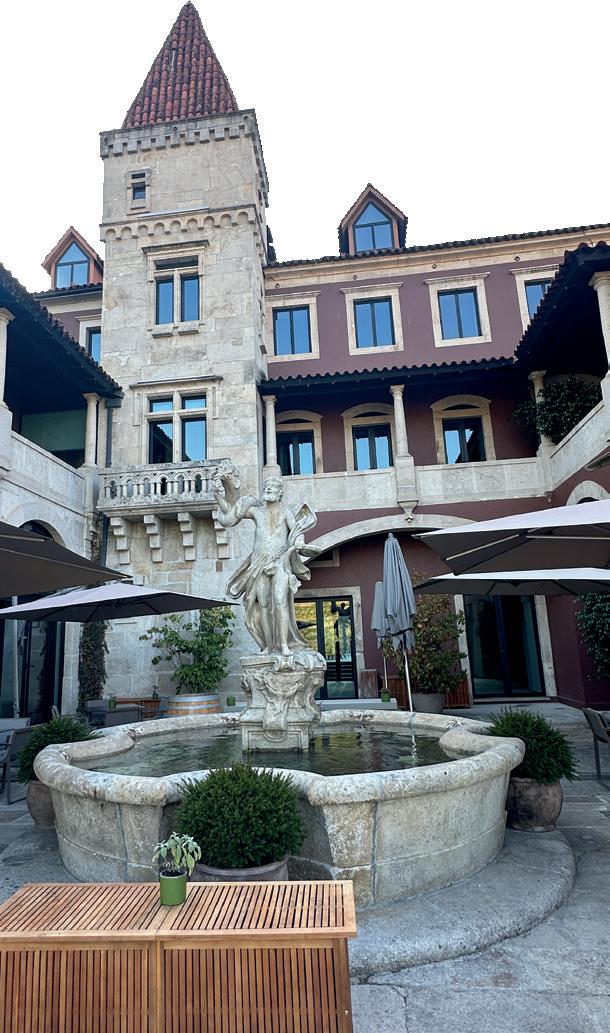
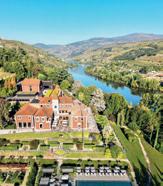


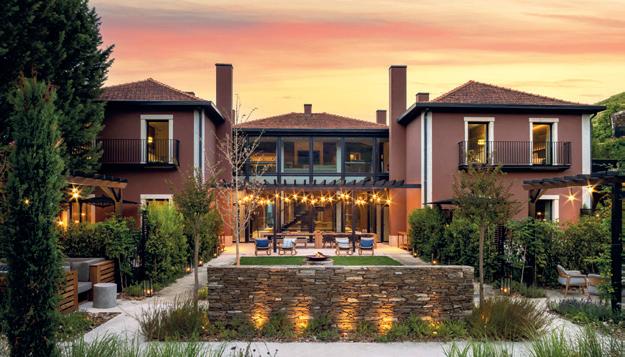














A MISSING expat whose body was found on the Costa del Sol at the weekend had recently landed a giant lump sum from a property sale.
The Olive Press can reveal that Andrew Wade, 65, had finally secured over €400,000 after winning a long legal battle with a dodgy British equity release company.
The expat, who went missing in Marbella a month ago, was found on wasteground, in Estepona, after an exhaustive search on Saturday by locals, police and firemen.
Wade, who Olive Press sources reveal had ‘a long-time cocaine habit’, had been planning to go back to live in the UK.
The former British Airways steward had landed the huge payout after he had sold his family’s property in Benahavis this summer.
“The money had finally gone through after a decade of legal wrangling over
‘foul play’ after body of Brit Andrew Wade found after scooping half a million euros on a villa sale
By Jon Clarke
a €1 million equity release charge,” revealed lawyer Antonio Flores, at Lawbird, who represents his family.
“He was delighted and there was certainly no reason to kill himself and you don’t normally overdose on drugs in the countryside,” he added.
Wade - who had been living in Malaga since around 2012 - had been reported missing to police after vanishing from his home on August 15.
He had been driving his black VW golf which was later found with his mo bile and passport, while he had
ALICANTE and Valencia airports are to get a €1.5 BILLION boost.
Prime Minister Pedro Sanchez announced the cash bonanza on a visit to Alicante Airport, promising bigger runways, new terminals and greener tech between 2027 and 2031.
left his two ‘beloved’ cats at home.
After an online appeal through media, including the Olive Press, police started to investigate.
But the investigation floundered until they suddenly announced a big search team would scour a wooded area near El Paraiso at the weekend.
It wasn’t long before the large team, using drones and sniffer dogs, found his decomposing body in deep undergrowth.
Police have so far given out few details but were quick to quash wild social media rumours the body had been ‘dismembered’.

It is part of a €13 billion masterplan for all of Spain’s airports. The bulk of the spend – almost €10bn – will go straight into expanding airports, with another €1.5bn earmarked for sustainability projects.
The biggest winners are Barcelona-El Prat and Madrid-Barajas, which will scoop nearly half the pot. Barcelona is set to get €3.2bn, including a new satellite terminal and a 600-metre runway extension to handle more long-haul flights. Madrid will pocket €2.4bn to boost capacity to a whopping 90 million passengers a year, with a huge €1.7bn makeover of its flagship T4 terminal.

“It is all certainly very strange and out of character,” continued Flores, who represented his parents in the equity release miss-selling case from 2013.
“I’ve spoken to his sister who says she is devastated and it just doesn’t make sense,” added the Marbella-based lawyer.
“The police are telling her very little and she is baffled as to why it happened.
“I guess one of the main questions is: is that money still in his bank account?”
The Olive Press has established that Wade, who was openly gay, moved to Spain to live near his parents who had retired here after buying the stunning €1 million villa in 2005.
He moved into the sumptuous four bedroom property with impressive grounds and swimming pool in Benahavis after his mother died a couple of years ago. They had been plagued by a de-



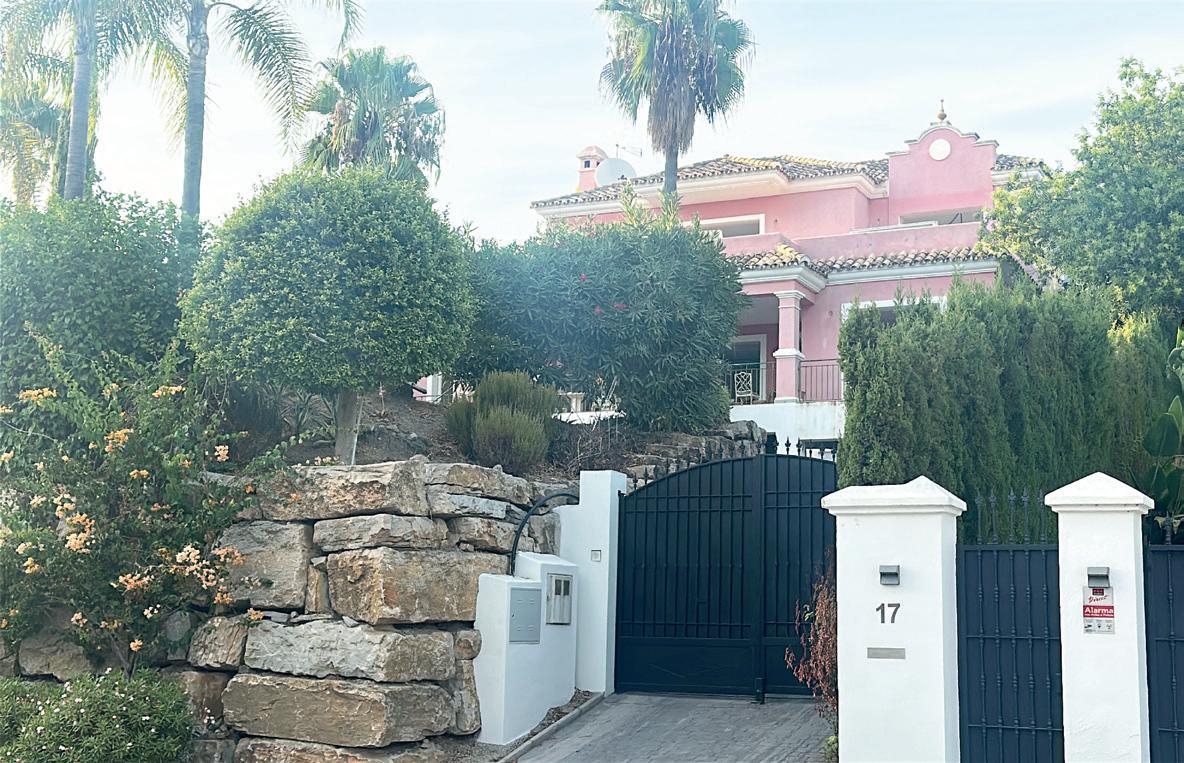
WINDFALL: Andrew had recently sold his family home
cade-long legal battle - which they finally won in 2023 - after being missold in an equity release scam which left them in negative equity.
Police are still refusing to officially name his identity, nor that it is a murder enquiry.
“We are still awaiting an autopsy result and can’t tell you anything else,” said
a spokesman for the Policia Nacional in Malaga this week.
“A body was found on Saturday after an exhaustive
search.
“We had been investigating all avenues since the missing man Andrew JW went missing in August. And the detailed search at the weekend proved positive.”
If you have any information, please contact newsdesk@theolivepress.es




THE family of Nathan Osman, 35, who died in Benidorm last year, say police are still dismissing foul play, despite the family arguing his death was not an accident and are demanding further investigation.
A MAN aged 56 who stole 30 foreign car number plates in a week in Denia has been charged with multiple counts of theft after a resident caught him red-handed and called police.
POLICE have arrested 19 alleged people smugglers accused of torturing and murdering 50 migrants on board a small boat heading from Africa’s impoverished western coast to the Canary Islands.
A DRUG mule in Cadiz was tortured for days after a shipment of cocaine and heroin went missing. His gang forced him to take laxatives while they waited for the drugs to emerge.
A SPANISH academic once welcomed as an expert on terrorism has now been branded a cyberterrorist and placed on Europe’s Most Wanted list. The National Police have identified Enrique Arias Gil, a 37-yearold professor from Madrid, as a senior figure in the pro-Russian hacking network NoName057. Europol has added his face to its
international database of fugitives wanted for terrorist-related computer crimes and being a member of a criminal organisation.
Investigators say Arias - the author of two books - used his academic credentials and me-
dia profile to hide his real role: supporting Moscow’s aggressive hacking cells.
In particular, he managed a Telegram channel that spread propaganda to more than 11,000 followers. He is believed to have passed sensitive information about Spain’s security infrastructure to hackers.

VETERAN Irish gangster John Gilligan cut a sorry figure as he signed on at a Costa Blanca courthouse - his first appearance since being released on €10,000 bail last month.
The 73-year-old looked a shadow of his former self as he arrived alone at the court in Orihuela near Torrevieja, swapping his usual dapper
Mafia boss Gilligan signs on as part of release conditions after raising €10k bail by WhatsApp begging
By Walter Finch
suits for scruffy shorts, an oversized shirt and dirty white trainers.
Gone was the expensive-look-
A BRITISH holidaymaker has been arrested in Benidorm on suspicion of murdering her friend with a vacuum cleaner cable.
The woman, 64, allegedly strangled her 66-year-old Irish pal, who we can exclusively name as Catherine Mary Bernice Peckham, in the apartment they were sharing on holiday. The shocking incident took place in the popular Rincon de Loix neighbourhood, an area sometimes dubbed ‘Little England’. Police were alerted after another British tourist contacted them, claiming a friend had confessed to strangling a woman with an electrical cable.
Police sources confirmed the victim was killed by strangulation but have not released further details about what may have led to the fatal altercation between the two friends.
ing attire he sported just over a year ago.
Instead, Gilligan appeared dishevelled. Court officials allowed the Irishman to slip out through a back door after completing his mandatory sign-on.
“Everyone else went out the way they came in through the front door, but for some reason John snuck out the back,” said one witness.
“It’s quite incredible someone with his history can get preferential treatment like that.”
Before his recent release, witnesses say Gilligan was reduced to sending desperate texts to friends and associates in Whatsapp groups across Alicante and Ireland begging for money to raise the €10,000.
“My name is **** I am a good friend of John Gilligan, he is 73, and in prison in Spain broke. John helped loads in
his life and now he needs help money wise, no amount too small,” the message read.
“Please share this WhatsApp wth you friend an how John’s friends get to see it. To sent to lawyers bank account (Details given). RE John Gilligan. Money gram, western union or bank transfers. (sic)”
As part of his bail conditions, the Irishman has been banned from leaving Spain, forced to surrender his passport, and must sign on at court regularly.
He spent eight and a half months on remand in Alicante’s Fontcalent Prison before his release on August 29.
The court appearance comes as Gilligan remains under investigation for allegedly running a Breaking Bad-style drugs laboratory capable of producing up to €8 million worth of narcotics from a property near Torrevieja.
A MAN who brutally murdered his tenant and then concealed her body in his Alicante flat for a month has been sentenced to 15 years in prison.
Despite the defendant’s diagnosis of a personality disorder and schizophrenia, a jury rejected the idea that these mental health issues had any bearing on the crime.
The tragic murder took place on August 29, 2023, when the defendant attacked the 66-yearold woman with a 15cm knife and a hammer. The court heard how the victim was unaware of the attack until it was too late, as the defendant ambushed her from behind in a corridor. She died from blood loss after the brutal assault. After killing her, the man tied the victim's body up with duct tape and dragged it into a bedroom, where he wrapped her in bin bags and a duvet, leaving her there for nearly a month.
THIEVES pretended to be charity workers to steal second-hand clothes worth around €1 million from Valencia region charity containers. The Policia Nacional have arrested 13 people- including the gang leader- over the theft of 300 tonnes of items earmarked for needy people.


BARGAIN BREAK:
Mayor Marco overlooks the home from his town hall office
WANT to follow in the footsteps of TV celebs Amanda Holden and Alan Carr?
Well now you can as the stunning holiday home renovated by the duo on their popular BBC1 show is now available to book.
Casa Alamanda Moclin is a three-bed home in the hilltop village of Moclin.
Abandoned for 35 years, it’s been completely transformed into a stylish self-catering getaway – and you can stay

By Jon Clarke & Dilip Kuner
there from €195 per night. The interiors haven’t changed a bit from the show: You’ll find the Moroccan bedroom with its handcrafted ceiling and Juliet balconies, the
AN army of Danish expats couldn’t believe their eyes when they watched their tennis team put Spain 2-0 down on the first day of a key Davis Cup battle.
With new world No 1 Carlos Alcaraz staying State-side after grabbing the US Open, it seemed a win was written in the stars.
However, joy turned to tears when the sporting nation came back to win 3-2 on the second day in Marbella.
The fightback to the Finals was led by a nail-biting doubles win.
Jaume Munar then levelled the tie by sweeping aside Elmer Moeller, before Pablo Carreño Busta defeated World No 8, Holger Rune.
The tie however was still a big win for Denmark’s thousand-plus fans, who sang a range of national songs, dressed up in red and white.
“It was a belting start, a real cracker from Rune,” said expat Janus Nielsen, owner of

Marbella-based AnyTech 365 (above).
“And then to see Moeller continue the trouncing was a joy,” added Nielsen. He continued: “I thought it was written in the stars when I saw that Carlito couldn’t make it,” continued Nielsen, who has known Alcaraz and Rune since giving them wild cards in an ATP tournament he first organised in Marbella in 2020.
“Rune is an amazing player and it is just a real shame that he couldn’t nick one of the last three points on Sunday,” he continued.
YOU don’t have to scroll far these days to find someone sounding off about immigration - whether it’s in the UK or right here in Spain.
And the second someone does, the labels start flying: racist, far-right, little Englander. But let’s be honest - most of the time, it’s not about race or nationality. It’s about respect.
Plenty of Brits - and I include myself - have made Spain our home. And by and large, the Spanish people have been incredibly welcoming. Since the first time I bought property here, I’ve had nothing but good vibes.
I’ve worked alongside Spaniards, shared meals, raised glasses, and been made to feel part of the community. Why? Because I’ve always shown respect for their country, their way of life, and their culture.
This isn’t about Spain vs the UK, or locals vs expats. It’s about decent people who make an effort, versus those who turn up with a sense of entitlement and no interest in fitting in. And let’s be honest - we’ve all seen them. Loud, brash, no manners, no clue.
The kind who treat Spain like their own personal theme park. If you wouldn’t tolerate that behaviour from a foreigner in your hometown, don’t come over here and do it to someone else’s.
I’ve never pretended to be Spanish - and I don’t need to. But I live here now, and I’m a guest in this country. That comes with re-
‘London-style’ bar and games room and a sunny roof terrace with views towards the soaring Sierra Nevada.
Everything was designed for Amanda & Alan’s Spanish Job with help from local artisans, giving the house a charming, hand-finished feel.
The new Welsh owners, Nicola and Mickey Walters, have generously pledged 15% of all rental income to the Moclin Women’s Association.
The group featured in episode four when Amanda made pastries with them.
The show has had a huge impact on the village – with more visitors, more business, and a real buzz returning to the area.
The mayor, Marco Perez, told the Olive Press it was ‘amazing fun’ working with Alan and Amanda.
“They brought such fun to the village and it brought some amazing memories,” he said. “It’s also really put the place on the map and given a very welcome boost to tourism.”
Local bar owner Mario Costela, added: “British tourists started arriving every day after the show aired.”

Immigrants

sponsibilities. Understand the culture. Embrace the customs. It doesn’t mean giving up who you are - it just means being a decent neighbour.
That’s why when people - like the British lady in Benidorm (above) recently - speak out about ‘foreigners ruining the UK’, it’s not necessarily hypocrisy. As long, that is, a she herself has integrated on her move to Spain, and shown some respect to the Spanish.
I’ve criticised some of the anti-tourist protests here in Spain in the past - the graffiti, the tone, the targeting of small business owners - but here’s the thing: I’ve never personally had a problem with the protesters. Why? Because I show up with respect. And

ANGELINA Jolie proved she’s no stranger to a downpour as she braved torrential rain at the San Sebastian Film Festival.
But she was also quick to criticise her country’s leaders at a press conference for the European premiere of her new flick Couture
The Oscar-winning admitted she was struggling to recognise America during these ‘very, very heavy times’. Choosing her words carefully, she said: “I love my country, but I don’t recognise it right now.
“I’ve always lived internationally, and my family’s international. My view of the world is one that’s connected.

“Anything that divides or limits personal expression and freedoms is dangerous,” she added.
She was joined by co-star Louis Garrel and director Alice Winocour for the film, which explores the lives of three women during Paris Fashion Week.


when you do that, people notice. In fact, many of us - the respectful expats and the frustrated locals - are singing from the same hymn sheet.
It’s not about where you come from.
It’s about how you behave.
And it’s the same story back in the UK. Yes, immigration in the 50s and 60s had its rough patches, but in the end, most people found their place.
They worked hard, adapted to British life, respected the rules and raised families that are now just as British as anyone else.
I hope the present generation of immigrants to the UK and also Spain (wherever they are from) integrate the same way. Because this isn’t about being anti-immigrant - it’s about being anti-ignorant.


EXPATS in Spain and Portugal
fear the sudden arrival of Madeleine McCann suspect Christian Brueckner after he was released from prison.
The paedophile and rapist has been living in temporary housing in the German town of Neumunster, after serving a seven-and-a-half year sentence for the rape of a grandmother, 72, in Portugal in 2005.
Despite wearing an ankle tag and being told he cannot go outside a three mile exclusion zone, many fear Brueckner, 47, is likely to return to his two favourite ‘stalking grounds’ in southern Europe.
“It is easy to cut those security tags with a knife and I’m sure that’s what he is planning to do,” a legal source told the Olive Press in Germany. It comes after it was revealed in the Sun newspaper that he has already bought a new mobile phone and is attempting to get an unregistered SIM card. Meanwhile, his lawyer con-

EXPLAINER: Victims and former acquaintance fear Maddie McCann suspect Christian Brueckner could head south after breaking ankle tag following release from prison
By Jon Clarke
firmed he is refusing to take part in a ‘rehabilitation programme’ because he claims he has been wrongly convicted of sex crimes.
“He is clearly in denial and still up to his old tricks,” continued the source. “And if he gets an untraceable phone and takes off his tag and flees Germany, we won’t be able to monitor him.
“He could literally end up any where, including Spain or Por tugal.”
scream’,” Busching told the Olive Press this week. “It came after I asked him if he was going back to Portugal often and if he knew what happened to the girl.”
Speaking at a secret location in Europe, the

While a regular visitor to the Algarve - where he lived for over a decade, much of it in Praia da Luz, where Maddie vanished in 2007 - Brueckner spent many months living on and off in Granada.
Also a regular visitor to Catalunya and Valencia, it was in the Alpujarra area that he had many contacts, who he bought and sold drugs to.
“We are really hoping he does not come back to Orgiva where he spent a lot of time,” one British expat told the Olive Press this week.
“He lived for many months off-grid hanging out with drug dealers,” she added. “And he attended various festivals here.
“Lots of people wondered how many sex crimes he may have committed here.”
Chillingly she added: “I know quite a few characters here that will want to kill him for what he has done. He also has plenty of bad debts.”
It was during one event, the Dragon Festival, in Orgiva, in 2008, that he ‘confessed’ to an acquaintance, Helge Busching, that he was involved in the snatching of Maddie, then 3.
“He told me she ‘didn’t


SUPPORT for Spain’s farright Vox party has surged to its highest level since the 2023 election, according to a new poll.
Vox now sits at 17.4%, up four points since May and five since the election, making it the fastest-growing party in Spain.










didn’t see him again. It turned out he left in the middle of the night in his winnebago. We didn’t see him again.”
The former expat, who was in witness protection for four years, testified to Scotland Yard and BKA detectives in Germany that he had seen videos of Brueckner beating and raping a teenager, about 15, and another elderly lady in Portugal.
Busching and a fellow German expat Manfred Seyferth, had found the videos at Brueckner’s home while he was in prison for theft in Portugal in 2006.
“It was definitely him as he was speaking throughout, plus I recognised his house in the video,” he told the Olive Press. “And then, at the end, he suddenly takes off his balaclava and you can see his face.”
Furious that the authorities have let him out of prison in Germany, he continued: “He is a very dangerous criminal and for sure he will commit more crimes any time soon.
“Trust me, there are going to be a lot of problems for the German police and, for sure,



some bad news coming.”
The Olive Press revealed in 2020 that Brueckner - who is still the prime suspect in the Maddie case in the UK, Germany and Portugal - sold stolen solar panels in Orgiva.
He was also a regular buyer of marijuana, cocaine and ketamine from a series of dealers in the area, before heading back to Germany to sell his wares.
He often brought his large winnebago van, which he revealed had a hidden compartment ‘large enough to smuggle a small child’.
The three-times convicted child molester is awaiting a retrial for a trio of rapes and two child abuse offences, both on the Algarve.
It comes after he was found not-guilty during a trial last year in Braunschweig.
He is also facing two more minor cases in German courts this Autumn.
While prosecutors in Germany say they ‘believe’ he kidnapped and killed Madeleine and they continue to investigate him, they admit they

don’t have ‘enough evidence’ to convict him at present.
Under the German judicial system, he can only be tried by a panel of judges and not a jury.
The British Metropolitan police has now taken up the baton and officially requested to interview Brueckner over the case.
While this has so far been rejected, they continue to investigate and have confirmed that despite being ‘rare’ they could prosecute the German in a British court of law.
Chief Inspector Mark Cranwell, said: “We can confirm this individual remains a suspect in the Met’s own investigation.”
While Brueckner has ‘refused’ a voluntary interview, he adds: “We will nevertheless continue to pursue any viable lines of enquiry.”
If you have any information on Brueckner or the case please contact jon@theolivepress.es
Easy and direct access without social media:
· Search for the channel on WhatsApp or Telegram.
· Click “Join”
· Activate notifications so you don’t miss any updates.
The conservative Partido Popular (PP) has slipped to 30.7%, its lowest in over a year, while the ruling PSOE rises slightly to 28.3% following a recent ‘corruption’ scandal.
Vox is gaining ground among young voters, mostly men, with 28% of those aged 25 to 34 backing the party.
A PEACEFUL Sunday evening turned into a devastating tragedy when a 20-day-old baby girl was killed and her mother seriously injured after a parked car rolled down a steep hill and struck them as they walked.
The young family had been visiting the children’s grandmother in the residential area of Empedrola II in Calpe.
Around 8pm, the mother, aged 37, was pushing her newborn daughter in a pram while the father walked beside her, holding hands with their five-yearold son.
Moments later, a parked car at the top of the hill began rolling down the slope, gained speed rapidly and struck the mother and baby.
The baby, critically injured, was taken to hospital in Denia but died soon after, while the mother is receiving ongoing treatment.
Official information:
· Managed by the Communication Department of Calp City Council.
· Avoids hoaxes and misinformation.
· Immediate updates in case of alerts, emergencies, or important notices.

You can also access it via the QR code:





Voted top expat paper in
A campaigning, community newspaper, the Olive Press represents the huge expatriate community in Spain with an estimated readership, including the websites, of more than two million people a month.
SPEEDBOATS slicing through the Mediterranean are no longer just ferrying hash.
Now, they’re packed with human lives - men, women, and children - risking everything for a shot at Europe.
The same criminal networks that once trafficked cocaine have found a more profitable cargo: desperate people.
A single boat can net over €500,000 in a week. The logistics are military-grade. The profits? Astronomical.
But behind the numbers is a mounting human tragedy.
Bodies washing up on Spanish shores barely make headlines anymore. Seven were pulled from the sea near Carboneras in Almeria this month alone. Hundreds remain missing. Thousands more land on beaches, dazed and traumatised, only to be caught, detained, or - worse - exploited again.
What’s worse, many of these crossings aren't born of mere economic desperation. They’re the fallout of political decisions. Spain’s 2022 pivot on Western Sahara enraged Algeria, leading to a collapse in cooperation on migration. Since then, departures from Oran have surged.
Meanwhile, stretched Guardia Civil units face dozens of boats at once, unable to intercept even a fraction. Arrests rarely lead to trials. Smugglers mock authorities on social media. And children arrive alone, exhausted from 15-hour crossings, to centres filled beyond capacity.
Yes, this is about criminality. Yes, it’s about border security. But it’s also about people - thousands of them dying or vanishing at sea while Europe argues over policy and Algeria turns a blind eye. Until there’s regional accountability and political will to address root causes, the traffickers will keep profiting - and the Mediterranean will keep claiming lives.
PUBLISHER / EDITOR
Jon Clarke, jon@theolivepress.es




Dilip Kuner dilip@theolivepress.es Walter Finch walter@theolivepress.es
Yzabelle Bostyn yzabelle@theolivepress.es
Samantha Mythen samantha@theolivepress.es
Tom Ewart Smith tom@theolivepress.es

Alex Trelinski alex@theolivepress.es
Joshua Parfitt josh@theolivepress.es
Dylan Wagemans dylan@theolivepress.es
Victoria Humenyuk Makarova (+34) 951 154 841 admin@theolivepress.es OFFICE MANAGER



Estefania Marquez (+34) 658 750 424 accounts@ theolivepress.es DISTRIBUTION ENQUIRIES (+34) 951 154 841 distribution@ theolivepress.es
please contact +34 951 15 48
Deposito Legal MA: 498-2019



ON many a sweltering afternoon this summer, speed boats were spotted skimming across the waves to Spanish shores.
To the casual eye they could be mistaken for thrill-seekers who’ve hired out a speedboat for the day – a common sight from almost any beach in Spain. Those who’ve lived on the southern coast for longer might believe they have detected the telltale activity of drug smugglers.
But the reality is darker still. These narco-style launches are no longer just transporting drugs.
Once they reach Spanish shores, instead of bales of hash, dozens of people hop into the water and scatter into the sun.
This is the new reality on Spain’s Mediterranean beaches, with Almeria at the epicentre.
The same networks that smuggle hash and cocaine into Andalucia have branched out into a more lucrative trade – ferrying migrants across the
Narcos diversifying and murky international politics have combined to cause an explosion in people smuggling
By Walter Finch

Mediterranean from Algeria. Videos circulating on social media show not just the scale but the brazenness of the operation, as high-powered speed boats dodge Guardia Civil patrols to offload their cargo – sometimes even onto crowded tourist beaches.
In one such case last month, a boat carrying a dozen men landed on packed Sotillo Beach in Castell de Ferro, Granada, at the height of summer.
– often returning the same week for another load.
In one week recently, an 11.5-metre Phantom made three quick round trips, landing around 150 people in total. One night it dropped off 50 passengers, filmed shuttling back and forth as if it were routine.
One gang had assembled a fleet of boats valued at at least €1million
Stunned sunbathers watched fully-clothed men jump into the surf before a few holidaymakers tackled them

SUNSHINE, sangria and... legal landmines? Spain may be known for its beaches and fiestas, but it’s also a hotspot for eyebrow-raising laws that can land you in hot water for doing the most mundane things – like building sandcastles or daring to own a mop.
To start with, new business laws can only be introduced in January or July (no, we don’t know why either). But that is just the beginning.
We thought we’d celebrate the end of the summer season the best way we know how – by rounding up 12 bizarre Spanish laws that are weirder than a flamenco flash mob at a funeral.
If you're planning to move here, make sure your dog is quiet, your mop is hidden, and for heaven’s sake, don’t die in Lanjaron…
1. DEATH IS LITERALLY BANNED
In Lanjaron, Granada, it’s illegal to die. The town’s old cemetery was full, and the mayor passed a law in 1999 urging residents to ‘remain alive’ until a new one could be built. It was part protest, part publicity stunt – but technically still on the books. Die here, and you’ve got a burial problem AND a legal problem.
2. SANDCASTLES? NOT HERE, MATE



Fancy a seaside sculpture session? Not in Tenerife. Building sandcastles is banned, and elsewhere like the Costa Blanca, you’re allowed only if you use the sand that is right there and flatten your work before you leave.
to the sand. The boat calmly turned back out to sea, while police made nine arrests onshore. Unlike the flimsy pateras long associated with crossings, these vessels are built for speed. With engines of up to 425 horsepower, they can make the run from Algeria to Almeria in hours
This summer’s Operation Nautilita exposed the industrial scale of the trade.
Raids around Almeria, Alicante and Sevilla revealed how one gang had assembled a fleet of boats valued at at least €1million: 15 semi-rigid boats, high-powered reserve engines, fuel stores, weapons and tens of thousands in cash. According to police, the network was structured like a corporation, with financiers, intermediaries, crews and logisticians all on the payroll.
Profits were funnelled through French shell companies and ‘hawala bankers’ before being reinvested in equipment. In a parallel case, Policía Nacional busted another group in Almeria and Alicante – not smugglers, but suppliers. Their semi-rigid boats were linked to at least four crossings that brought over 80 migrants and €560,000 in profit. With euro signs dangling, it’s not hard to see why narcos switched up. Each passenger pays between €6,000 and €10,000, always in cash.
Frontex warned in its 2025 Risk Analysis that mafia gangs are now turning tactics towards ferrying people, rather
You must be joking! 12 bonkers laws that’ll leave you baffled (and possibly
By Dilip Kuner

This all stems from one overambitious builder who tried to recreate a medieval fortress by shipping in tons of sand. Classic overkill.
3. BARKING? SIESTA SAYS NO Villanueva de la Torre in Castilla la Mancha takes its naps very seriously. Dogs are banned from barking between 2pm and 4pm and at night. Enforcement is a mystery – perhaps a stern letter
fined)

to the canine in question? It’s one of many OTT rules in the town's lengthy ordenanza, which reads more like a novel than a law.
4. NO RADIOACTIVE WASTE IN BINS (OBVIOUSLY)
Also in Villanueva de la Torre: a rule specifically banning residents from dumping radioactive waste in local bins. A solid policy – except for one small problem. The town doesn’t have a single nuclear facility. Safe to say, the bins were probably already in the clear.

6. DOMINOS OF DOOM
Sevilla might be all flamenco and fiestas, but don’t try to play dominos at an outdoor cafe. A local noise law bans it – apparently, the clack of the tiles is too much for local ears. Also prohibited? Rolling barrels down the street and standing near restaurant terraces with food or drink. (Yes, really.)
7. DON’T TAP DANCE AT HOME
5. BAN THE MOP!
Got a mop on your balcony?



That’s a €750 fine in some parts of Castilla–La Mancha. Hanging clothes out to dry? Also banned if visible from public spaces. The message is clear: clean in secret or suffer the consequences.


In Madrid, Mojacar and Ciudad Real, you’re forbidden from running, skating or tap dancing inside apartment buildings. Presumably clog dancing is a capital offence. It’s all part of Spain’s mission to keep neighbourly peace – especially in a country where two-thirds of people live in flats.
8. NO FEEDING PIGEONS
Feel like tossing some breadcrumbs in Placa

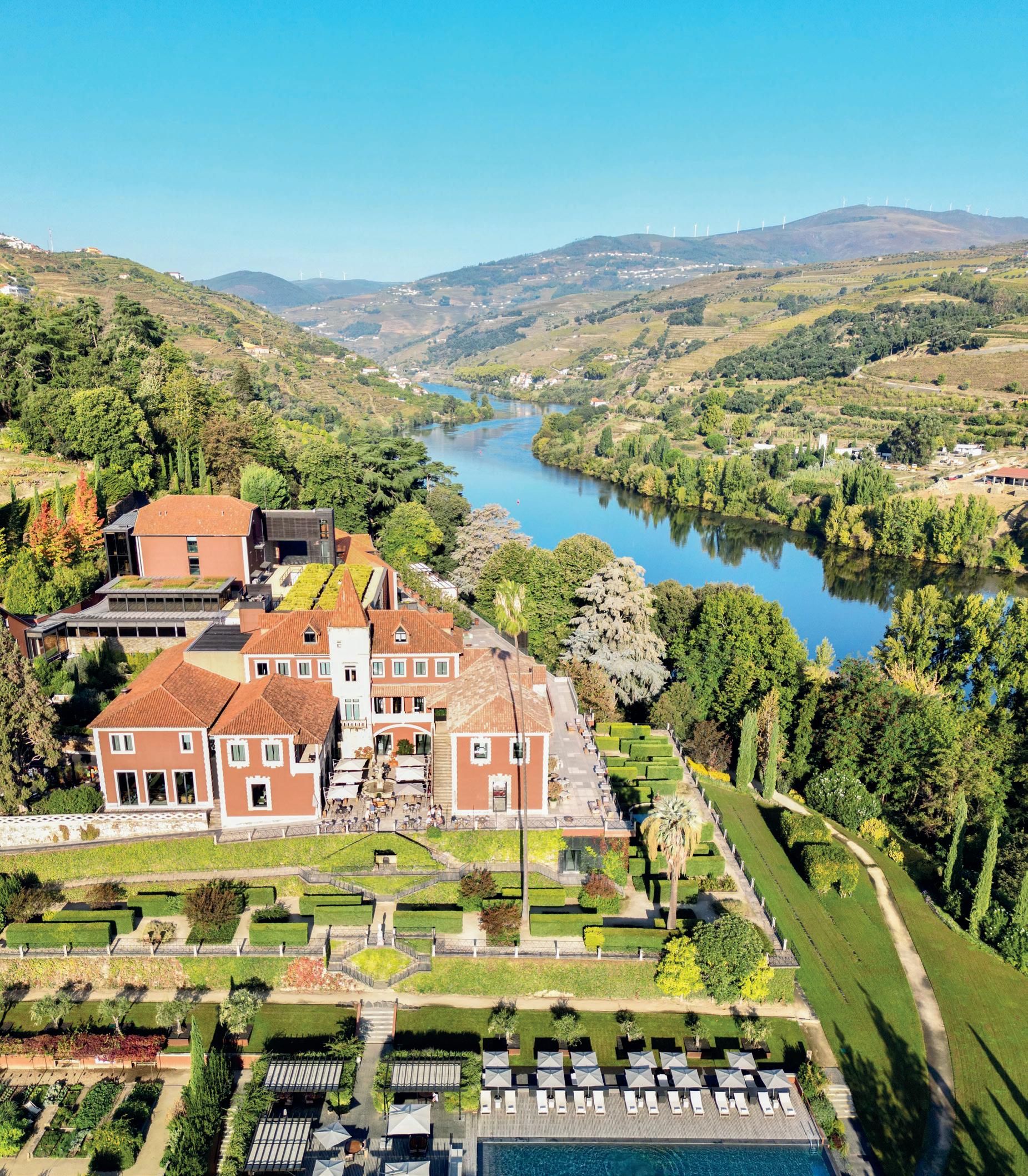

As Portugal’s most expensive hotel reaches its 10th anniversary, the Olive Press asks if it is justifiable to drop €1,500-a-night at this stylish architecural gem
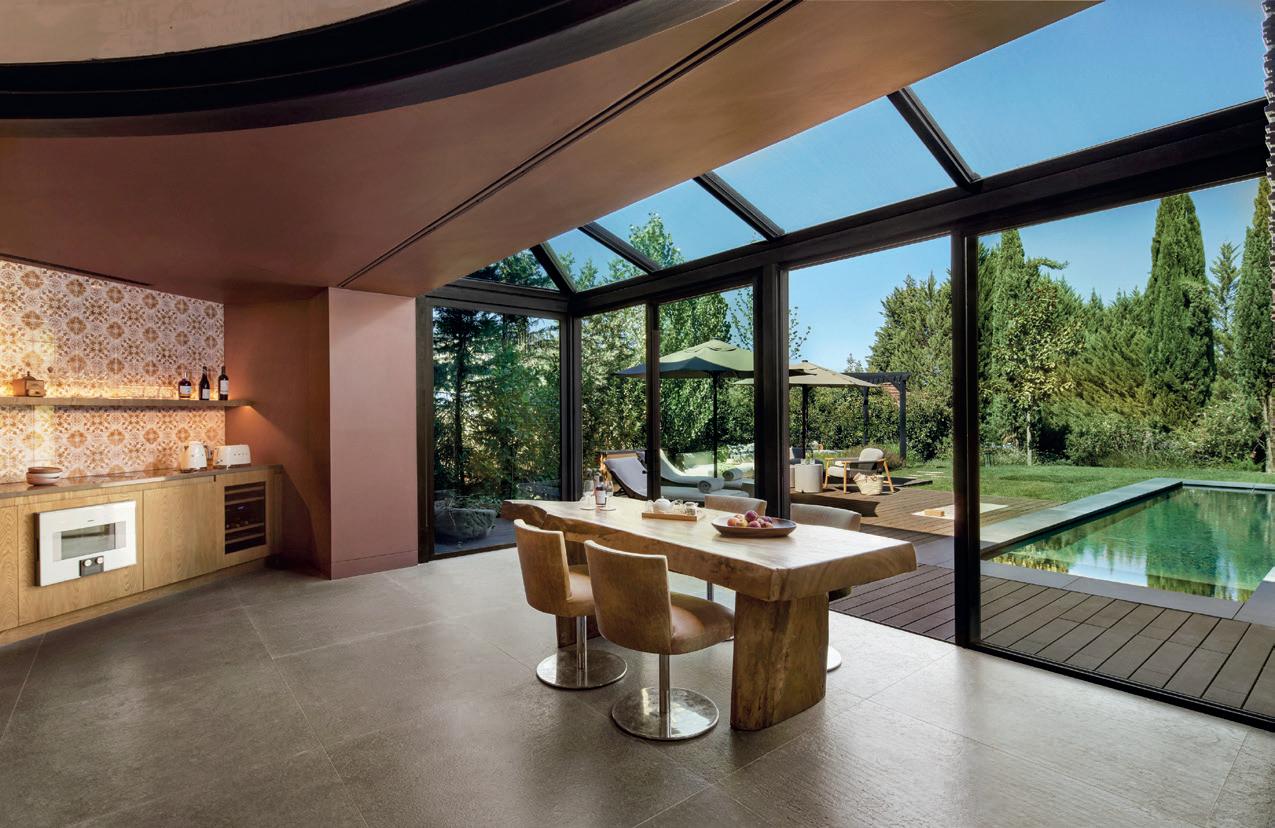
SPAIN’S housing market is showing no signs of cooling down, with analysts predicting prices will reach ‘levels never seen before’ by the end of this year.
The prediction comes as official figures reveal prices soared by a record-breaking 12.7% in the second quarter of 2025.
This is the highest annual increase since records began, according to Spain’s national statistics office (INE).
And the rises are not set to ease up, -according
Spain’srecordhousingmarketisfarfrompeakingdespite pricesreachingunprecedentedlevels
By Walter Finch
to investment expert Montse Cespedosa.
“In the last quarter of 2025, both sales volumes and prices will reach levels never seen before in Spain’s history,” said the financier, who boasts
over 27 years of banking experience. She added that anyone considering buying property here should brace for further price hikes. And despite the market already being at record levels, she warned there is no escape route from the chronic shortage of supply and excess demand plaguing the sector.
It comes as Spain’s mortgage market is also hitting record numbers in 2025, with 243,257 home loans signed in the first half of the yearthe highest figure since 2011.
“There is a volume of mortgage operations that I haven’t seen for years,” she continued. She also ruled out any imminent housing bubble similar to the 2008 crash, when banks recklessly granted mortgages to people who couldn’t afford them.
“There are still no signs of a bubble, but there is evidence of market overheating,” she concluded.
As it reaches its tenth birthday, Jon Clarke runs a rule over the Portuguese spa hotel - the country’s most expensive - where even the lift shafts are cool thanks to the views and furniture
WHEN leading Asia hotel
chain Six Senses decided it needed an outpost in Europe, to show off its incredible eye for detail and how to look after guests in the most sustainable way, it didn’t opt for the obvious places like the south of France or the Balearics… even a key European city.
The group, which launched in Thailand and Vietnam in 2004, unearthed an extraordinary 19th century wine estate on the bend of the Douro river some 100 km inland from the city of Porto en route to Spain.
By acquiring this obscure family-run vineyard and hotel they could quietly go about their business turning it into probably southern Europe’s most beautiful rural escape and
By Jon Clarke

with a price tag to match, it now being Portugal’s most expensive hotel.
With an ethos geared around local organic produce, sustainability and wellness, when their first hotel in Europe opened in 2015, the group rapidly stole a march on this rapidly growing inland rural sector of tourism.
Since adding the obligatory statement hotel in Ibiza (see Olive Press review) and a spa in Marbella, they have continued to grow globally into spots like the Maldives, India, and now even America. In Europe they also count on Courchevel, Crans and Rome.
it is anything but grand, particularly if you arrive via the bottom road close to the river, along an ancient cobbled track lined with rows and rows of vines from a string of local estates.
The hotel eventually comes into view surrounded by woodland and a sea of vines clamped to every available terrace within five kilometres of the place.
It’s something of a pile but fairly in keeping with the local vernacular… as you’d expect from a 200-year-old bodega.

UPLIFTING: Waiting room by the lift shaft
at in Europe (more of which later), we head out into the grounds, for this is perhaps, the real key to the success of the place.
And while I’ve only previously visited Ibiza, the arrival at the Six Senses Douro Valley is so breathtaking it’s unbelievable.
Low-key luxury at its best,
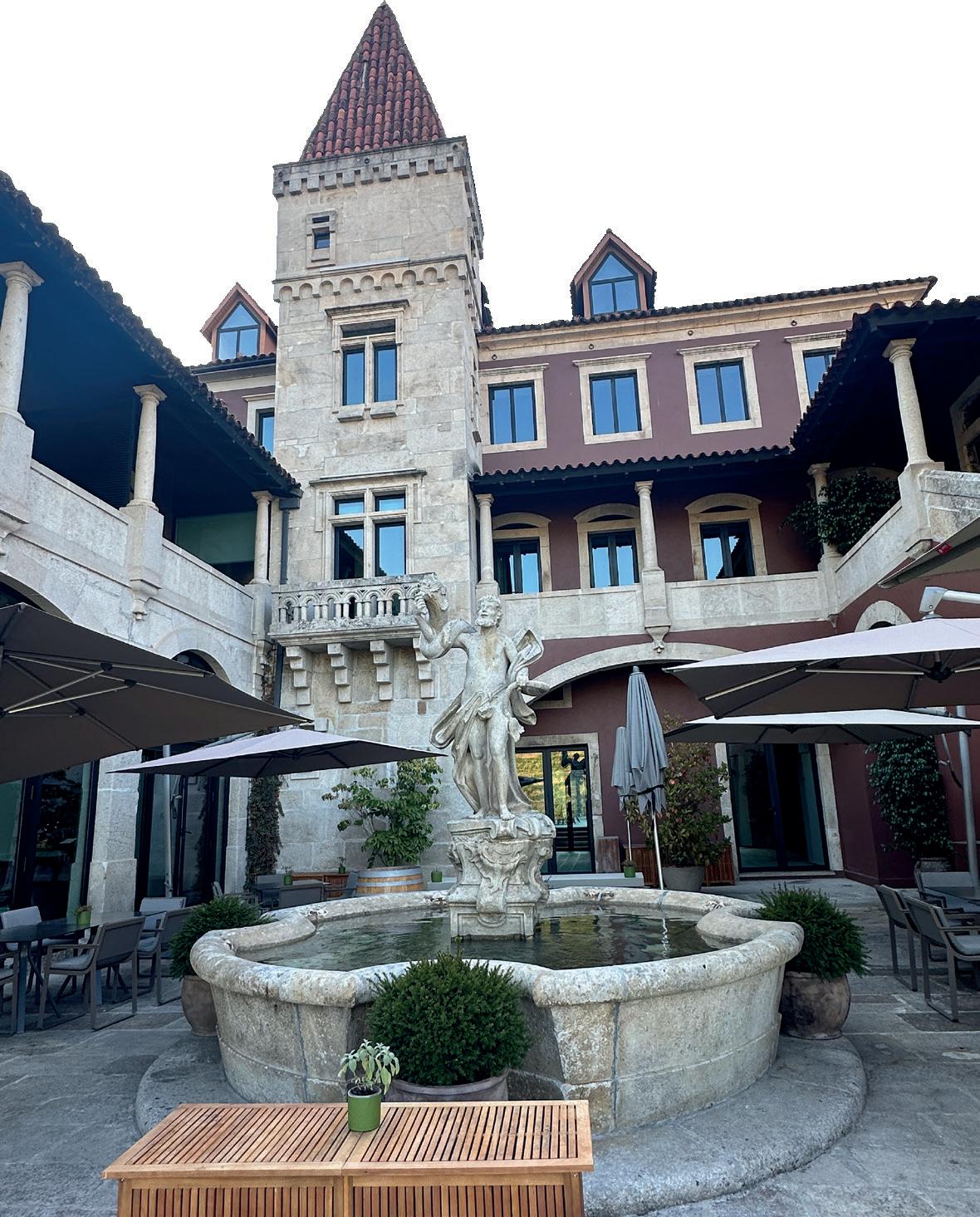
There’s a pointed stone steeple, a charming Italianate loggia, stone pillars and unusual stone windows that turn out to be more recently installed. The burgundy walls match the wine-making tradition, while the local Portuguese pantiles complete the composition.
The understated sense of arrival is accentuated by our receptionist David, now in his fourth year, and carrying an incredible knowledge about the area and wider group which now has 27 hotels around the world.
He tells us a bit about the aristocratic family, who reluctantly sold up in 2001 to become a boutique hotel that was sadly ‘before its time’, a bit too modern and pricey, by all accounts, for the region, prior to the budget airlines arriving in 2013/14.
Once guided to our suite, which is among the most stunning I’ve stayed
Enveloped by a copse of mixed woodland, the wondrous mature gardens cascade down many levels, right down to the river, in fact, where there is a pontoon and naturally paddle boards and other exciting craft ready to be used by guests.
(Note to self: next time arrive by river!)
Exploring the woods, then formal gardens is joyous. Each section is divided by myrtle hedges, rusted iron walls clad in ivy or other climbing plants, pleached fruit trees, green walls and lines of rosemary set up high in original horizontal planters.
There are evocative openings into olive groves, vegetable gardens with avocado trees and a more formal garden of pergolas, which gives a sense of both privacy and space. Don’t miss
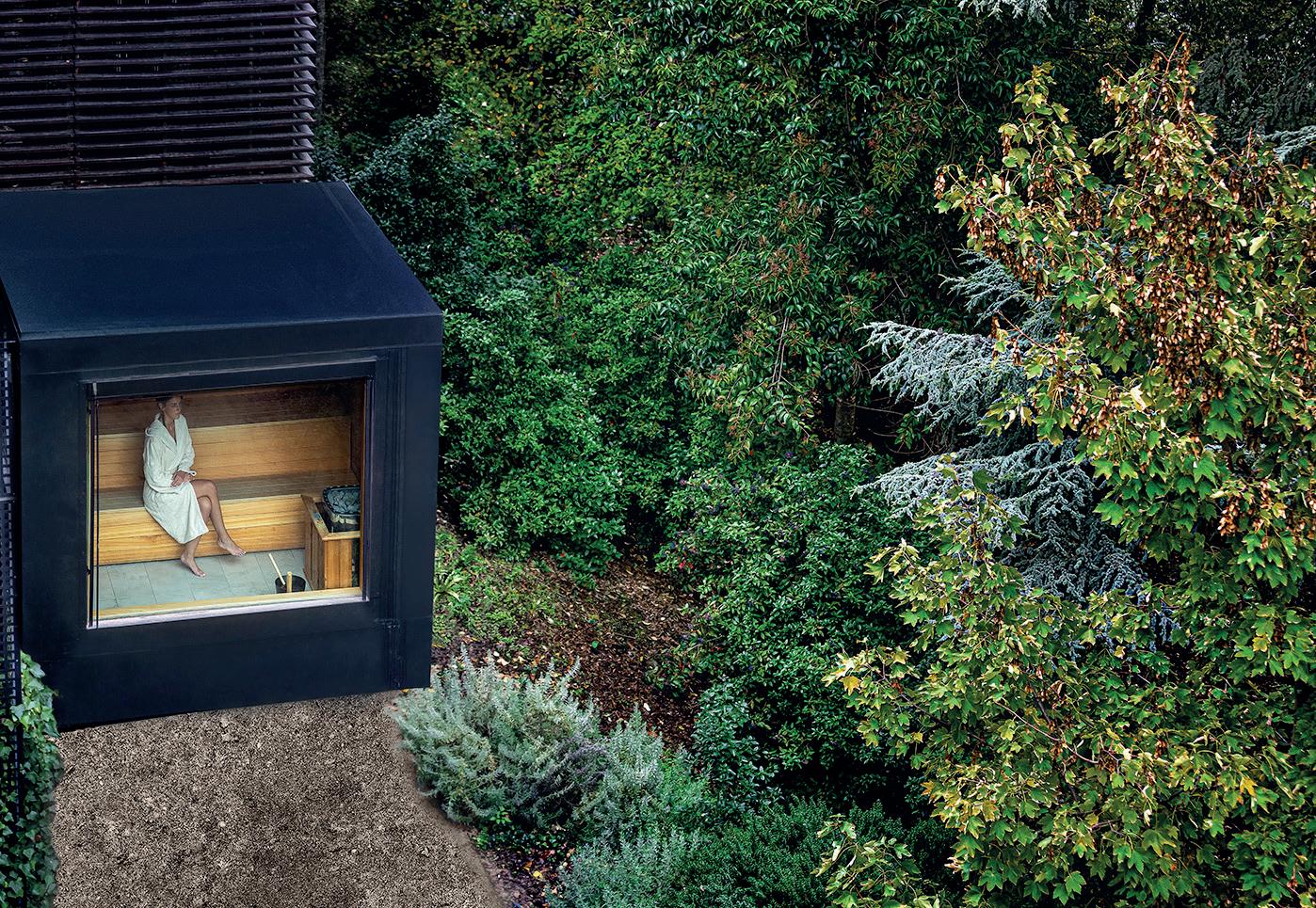
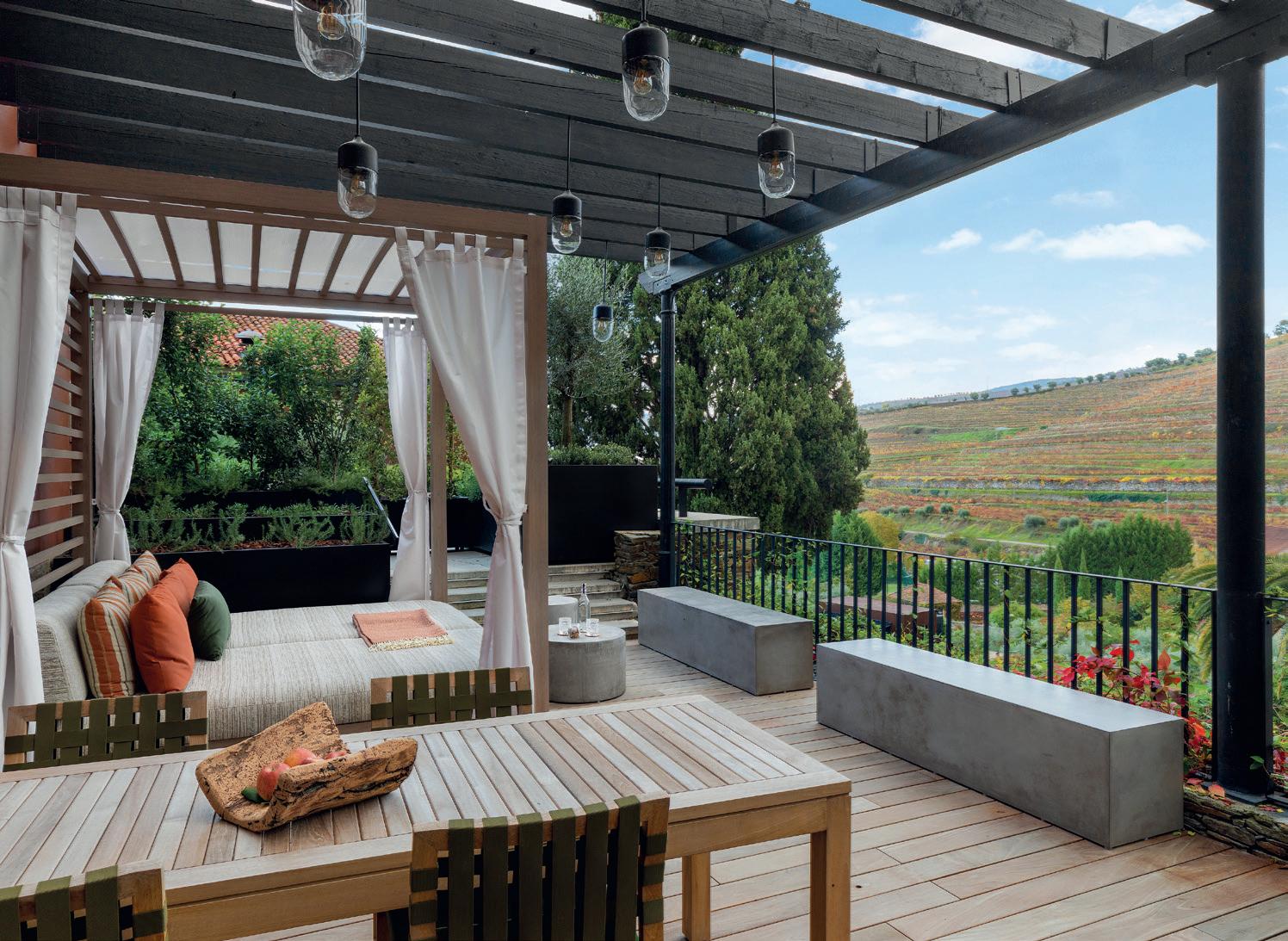
INTERVENTIONS: There are plenty of modern additions to the 200-year-old estate, but it keeps its integrity thanks to design guru Clodagh
the steps up to a grotto cave where fresh spring water trickles out. It’s hard to imagine a more natural setting for the swimming pool with the green Douro valley on one side and an entire slope of vines on the other, while the guests who sit around it are, unsurprisingly, among the world’s most successful movers and shakers. Think White Lotus meets Love Island, at least as far as physiques go. I loved the easy pivot to the pool bar restaurant, just a cat’s swing away, a calming spot awash with sea green and terracotta cushions on natural undyed linen sofas.
The ‘snack menu’ is equally easy, light and minimal with a bent towards healthy eating…they call it the ‘Tasty Stuff’ and it has two types of gazpacho, one a delicious strawberry number with a king prawn tartare sliced up in the middle.
A trio of salads, one from their vegetable garden with grilled pickled carrots, courgettes and almonds is a surefire winner, while the line-caught sea bass ceviche was spicy and prepared to perfection.
The free-range chicken is also a delicious, if slightly scrawny leg, cooked on the grill with a strange sprinkling of local cheese on top.
Portions are extraordinarily small, which no doubt suits the young attractive couples, half of them honeymooners at a guess, who seem to spend most of the day luxuriating by the pool.
The wine tasting, open to all guests and strongly recommended, starts each evening at 6pm - and comes with snacks and a cool wine tasting notebook, plus a superb carved wooden wine map of the region.
It’s highly instructional, and leads nicely on to our evening meal in the main restaurant, which again is style personified thanks to the incredible eye of oddly, an Irish interior designer, now in her mid 80s, based in New York called Clodagh. Described as

Think White Lotus meets Love Island, at least as far as physiques go a ‘pioneer of green design’ she found her vocation living in Spain in the 1970s. So much of what makes the Six Senses Douro wonderful can be put down to her. An extraordinary woman, I love the lamp made of wine bottles and the farm implements on the wall, plus close up photos of terrain. I also love the sauna (above left) that looks out at the

November 29thDecember 12th 2023

landscape and the hanging chairs to enjoy the view from the lift shaft lobbies. I literally wouldn’t have minded spending a morning there with a good book.
Next we bowl along into the main restaurant, which is full of natural materials; textiles, wood and stone, all thanks to Clodagh, who utilised hundreds of blown up photos of the finca from years gone by - plus wonderful photos of its owners (grandchildren roller skating, grandma on her mare etc).
The hessian and wooden beam ceiling and blue and white striped lined chair covers sum up the attention to detail. Also keeping with its wellness philosophy there are lots of vegetarian and vegan dishes, such as grilled ‘hispi’ cabbage - with smoked goat butter, lime pickles, hollandaise and peppers…what a dish ! Succulent, creamy and smoky, all done on the grill.
There are also ‘heirloom’ beets with a coconut labneh and pickles and green strawberries, while seasonal organic asparagus with saffron and lemon was more to my flavour.
Meat eaters were not entirely ignored and there was a splendid handchopped pasture fed beef tartare, while the line-caught sea bass and Algarve pink prawns made the table.
Once again, it’s worth mentioning these were no huge American size portions, but minimalist and much more importantly packing flavour.
And finally it was off to our suite, which counted on the most amazing east-facing terrace from where I lay the following morning on a giant day bed marvelling at a wall of vine terraces, literally line after line of bright green tendrils, just weeks, or even days, from being denuded of their grapes in the autumn harvest.

There are so many special touches, such as a secret drawer by the minibar which opens to not just tea bags BUT sachets of fresh tea leaves while at night the fairies leave bottles of fresh water all around. Meanwhile a jar of sea salt and a loofah have been thoughtfully left beside the bath, while all the products are in classic blue and white Portuguese porcelain.
The TV is cleverly hidden by a sliding painting and if there’s anything else you need or don’t understand, an iPad
on the wall immediately connects the guest to a live chat system, where you can ask for anything you might need.
“I promise you it’s not an AI assistant,” explains David. “So please don’t swear or try and confuse it because it will be one of our team trying to help” It was this way I found out about the tea drawer but a sign of the times, when I ask for a copy of a British newspaper, the reply was only: ‘We will need to find out how to get one.’ They didn’t.
Finishing on a positive note, the breakfasts are as much as possible, cooked in the wood oven, even including pancakes … which are extraordinary! Fresh plums, crème fraiche and icing sugar. Don’t stay for just a night. Stay for a week, or a month, that is if you’ve got a spare €50,000.
Rooms start at around €1400 a night. Visit www.sixsenses.com for bookings and information.
BACK in January, Prime Minister Pedro Sanchez grabbed headlines with a proposal to either tax or ban non-EU, non-resident foreigners from buying property in Spain.
First floated as a punitive 100% surcharge on property purchases, the idea briefly hardened into talk of an outright ban, before reverting to the original tax model in May when the PSOE president tabled a draft law in Congress. Since then? Radio silence.
The draft law was bundled into a wider housing package with incentives for cheap rents, tweaks to the tax treatment of listed property companies, and higher VAT on tourist apartments.
But the foreign-buyer tax was always the most controversial element, and it has failed to gain traction.
The government doesn’t have a majority, and parties of the right will not back a new property tax, while the far left argue the measure doesn’t go far enough. With the proposal stuck in gridlock, nothing has moved forward. Even regional initiatives haven’t changed the picture.
Catalunya’s parliament passed a motion in June calling for restrictions, while Canary Islands politicians are exploring their own measures.
Yet without consensus in Madrid, these gestures remain symbolic.
And even if Sanchez could conjure a majority in Congress, Brussels would likely strike the plan down.
The European Court of Justice has consistently ruled against attempts to discriminate against foreign buyers on the grounds of free movement of capital.
Austria and Hungary have already failed with similar experiments.
Nine months on, the much-vaunted measure is still stuck in the starting blocks.
In the meantime, international reports have sometimes presented the tax as if it were already law.
The reality is different: it is far

more likely that the proposal will remain a political gesture designed to appease left-wing voters than ever become enforceable legislation. And the data only underlines how nonsensical the idea always was.
In 2023, Sanchez claimed that 27,000 non-EU foreign non-residents (FNRs) bought homes in Spain, suggesting they made up almost half of the total FNR market.
Yet notary figures – the government’s own source for housing statistics – show the true number was 18,648, or just under one third of the market.
That is a discrepancy of almost 10,000 buyers, with no explanation offered.
The latest notary data for 2024 reinforces the point. The market share of non-EU FNRs slipped from 2.9% in 2023 to 2.7% last year. In other words, an insignificant segment that is now in decline –hardly the driving force behind Spain’s housing crisis.

INSIGNIFICANT: Non EU buyers are not only small in number, but they are dropping even more
Nor do these buyers compete with locals for affordable homes.
The main groups are British, American, Swiss and Norwegians, typically purchasing coastal holiday homes rather than flats in Madrid or Barcelona.
Removing them would not free up
housing for Spanish families, but it would hurt regional economies dependent on foreign demand. With fresh data due next month, there is little reason to expect the picture to change. This never looked like serious housing policy – just political theatre.

Propertysector fuels record business surgewitha quarterof allnew companiesformed
By Walter Finch
SPAIN’S property sector is driving an impressive business boom, boosting market confidence to its highest in years.
The latest Business Demographics Study by Informa D&B reveals that 84,938 companies were registered from January to August, a healthy 4.3% increase over last year.
And a quarter of them - around 22,000 businesses - were in construction and real estate, a 10% rise from 2023.
For expats and second-home buyers eyeing property investments, the figures signal a flourishing market.
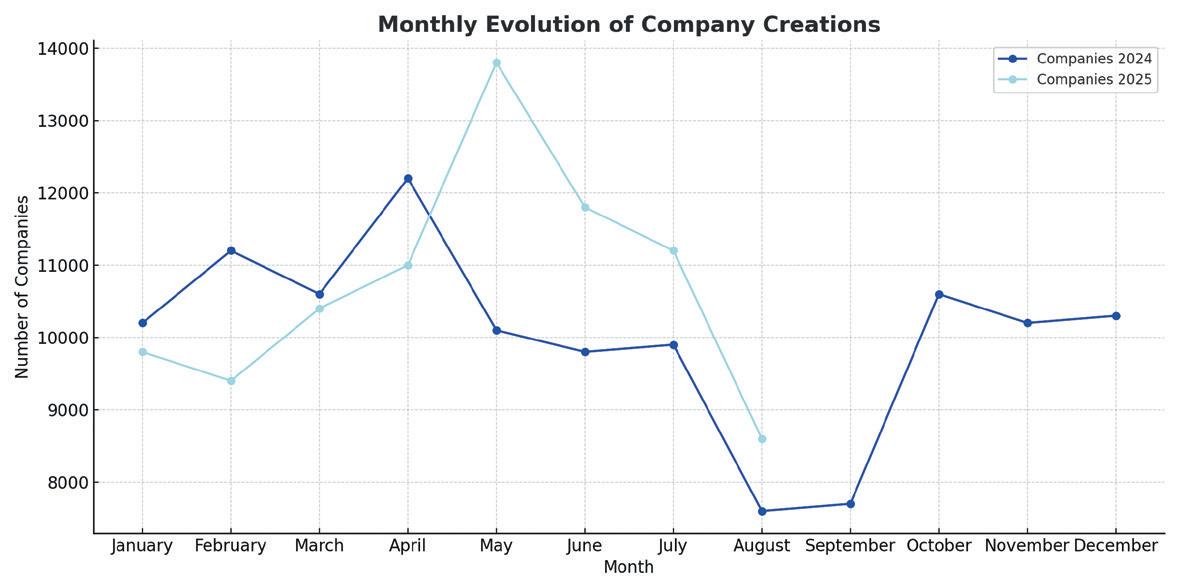
Madrid is the undisputed leader in new business creation, with 19,021 companies registered - an increase of nearly 1,000 from the previous year.
Catalunya follows with 16,648 new companies, while Andalucia completes the top three with 14,185 firms.
Together, these three regions account for 59% of all new businesses, with popular expat hotspots like the Costa del Sol and Barcelona seeing the lion's share of activity.
DEMAND for rental homes in some neighbourhoods across Spain are approaching physics-defying speeds.
At least one in five homes get snapped up within hours of going online, and


Barcelona's rental market moves fastest of all.
In Sant Andreu, a staggering 22% of properties evaporate within 24 hours, closely followed by Horta Guinardo at 21%. Nou Barris isn't far behind at 19%.
The centre is slower at around 10%.
Madrid’s rental race is less frantic but still swift. Moratalaz tops the charts at 11%, with Latina and Puente de Vallecas neck-and-neck at 10%.
The capital's most expensive postcodes move slowest. Chamberi and Salamanca crawl at just 4% a day, while Chamartin and Moncloa manage a modest 5%.
Malaga keeps things relatively steady.
Churriana leads at 13%, Teatinos follows at 10%, and most districts cluster between 4% and 9%.
Valencia shows a tale of two speeds.
The Jesus district races ahead at 18% - nearly one in five properties gone in a day.
Rascanya follows at 10%, but most other areas tick along at single digits.
Sevilla presents the most dramatic contrasts. Cerro Amate blazes at 16%, while Santa Justa hits 10%.
Andalucia is seeing particularly impressive growth. In August alone, 182 new companies were established, while the Canary Islands, another favourite of international buyers, saw 175 new incorporations.
However, the study also reveals some intriguing contrasts. While new businesses are booming, total capital investment fell by 11.2% to €3.77 billion.
This suggests entrepreneurs are focusing on leaner, more nimble operations rather than large-scale developments.
In terms of regional investment, Andalucia leads with €934 million - up 27% from last year - while Catalunya attracted €716 million, and Madrid secured €647 million.
WITH its eye-catching orange tree-lined streets, renowned gastronomy and spectacular monuments it’s no surprise that Sevilla has become a leading destination for tourists.
But while the Pearl of Andalucia received around 4.8 million tourists last year - behind only Madrid and Barcelona - this steady stream of sightseers has had some unwanted consequences.
According to government data, Sevilla is the city with the highest number of tourist apartments operating outside legal regulations, with a staggering 2,289 units.
Marbella though, is not far behind with 1,802 illegal rentals, while Malaga has 1,471 and Benalmadena 926.
Andalucia meanwhile, has an alarming 16,740 illegal tourist lets - the highest region in Spain - followed by the Canary Islands (8,698), Catalunya (7,729) and the Valencian Community (7,499).

Last summer, Sevilla’s city council vowed to wage war on the proliferation of illegal tourist lets by disconnecting the water supply to illegally-operated tourist apartments.
Three owners appealed, but their complaints were thrown out in court who said action taken by the council was lawful.
In Barcelona, mayor Jaume Collboni announced that the city would effectively ban tourist apartments by 2028 by not renewing the licenses of over 10,000 legally operated flats. And Pedro Sanchez announced plans last week to remove 53,000 tourist apartments from rental platforms across Spain. He added that problematic properties would be converted into permanent rental accommodation for young people and families.
PLANS to turn one of Barcelona’s most famous cinemas into a new Thyssen museum have sparked fury among locals.
The Federation of Neighbourhood Associations of Barcelona (FAVB) claims it is merely property speculation dressed up as culture.
The group is leading opposition to the nine-storey scheme at the former Cinema Comedia in the Eixample district.
They say the project will gut the original Palau Marcet building, leaving only its facades as ‘decoration’ for a vast new complex that will include shops and restaurants alongside exhibition spaces.
A manifesto signed by 1000 residents and 49 organisations argues that the project breaches planning rules, exceeds height and depth limits, and ignores official heritage guidelines.
Among the biggest complaints is that at least a quarter of the site is earmarked for luxury retail – a move opponents call wildly inappropriate for such an ‘iconic corner’ of the city.
Critics also slam the proposed ‘brutalist’ architecture as


out of place, and point out that no detailed museum plan has yet been published.
The Cinema Comedia building holds a special place in local memory, having been a beloved cultural landmark before closing in recent years.

By P OO LVILLAS





September 25th - October 8th 2025


than drugs, raising fears that some organised criminals could slip into Europe under the cover of migration.
According to the government, more than 90% of migrants are landing in Almeria and so far this year some 5,000 people have arrived in the province.
And many of the migrants do not make it. The dangers are clear: some seven bodies were recovered off Nijar and Carboneras, near the Cabo de Gata Natural Park, earlier this month.
The Andalucian Human Rights Association said 19 bodies were recovered in Almerian waters last year while 213 remain missing.
Over four decades, it has counted more than 19,000 lives lost, three-quarters in just the past five years.
The International Organization for Migration recorded more than 2,400 deaths and disappearances across the Mediter-
ranean in 2024 – the deadliest year on record.
The situation in the Balearics is more chaotic with many more flimsy dinghies and inflatables taking a 15 to 20 hour crossing.
In August alone, 4,852 people landed on the islands – a 71% increase on last year.
Many were Algerian, but Somalis and sub-Saharan Africans remain the majority. The price is lower at €1,500 a head, but the risks are far greater.
The Balearics are illequipped. By mid-August, Formentera alone had seen 1,400 arrivals on 81 boats, including 136 unaccompanied children.

with an emergency €4.1 million subsidy approved.
On the frontline, the Guardia Civil is overstretched. Sources describe afternoons when more than 20 boats attempt landings at the same time. It is impossible to intercept them all.
Facilities are running at 150% capacity, housing more than 600 minors in spaces for 400.
The cost is spiralling – €1.5 million was spent in Formentera in just two months,


Think again. Feeding pigeons in Barcelona is strictly forbidden and can land you with a fine of up to €600. The city declared war on its feathered freeloaders in a bid to reduce the poo and chaos. One unlucky tourist even got slapped with a penalty mid-selfie.
9. NO SLEEP IN BILBAO
In Bilbao, it’s illegal to sleep in your car –or anywhere in public, really. The city bans snoozing in cars, vans, tents, caravans and even on benches. And don’t even think about bathing in a fountain or washing your socks in public. Just get a hotel room.
10. WATCH WHAT YOU NAME YOUR BABY
Spain doesn’t have an approved baby name list like Denmark, but it does have a banned list. Names like Judas, Cain and Lenin are strictly off limits. So if you were planning to raise a tiny revolutionary or biblical baddie, you’re out of luck.
11. YOU MUST HAVE A SPARE PAIR OF GLASSES
If you wear glasses and drive in Spain, you’re legally required to carry a spare pair in the car at all times. Forget and get caught? That’s a fine. So if you’ve got dodgy vision and a heavy right foot, pack those specs.
12. LEAVE YOUR LAWN FLAMINGOS AT HOME
Planning to decorate your Costa home with neon pink flamingos or gnomes? Not so fast. In several towns with strict communities of owners (especially in resort areas like Marbella and Torrevieja), lawn ornaments are actually banned to ‘maintain aesthetic harmony’. To be fair, that is a private regulation rather than an actual law, but it still applies. It’s like Desperate Housewives, but with more paella.
Even when smugglers are arrested, prosecutions are rare. In Almeria, 139 people were arrested for trafficking in three years, yet in 2024 only 33 cases reached trial. Meanwhile, smugglers post mocking videos online.
The roots lie in Algeria. Videos from near Oran show dozens of people wading into the surf or clawing onto inflatables as engines roar – in broad daylight with little visible interference.
While Algerian police occasionally seize boats, the flow suggests enforcement is selective or relaxed. Analysts link this to Spain’s controversial Western Sahara shift in 2022, when Pedro Sanchez backed Morocco’s autonomy plan.
Algiers reacted furiously, recalling its ambassador, suspending a treaty, freezing trade and – crucially – scaling back cooperation. Since then, departures from Algeria have surged.
Unlike Morocco, Algeria has rarely used migration as a pressure tool – but its unwillingness or inability to act has raised eyebrows.
For the gangs, the calculus is simple.
The demand is there – Algerians seeking work, sub-Saharans stranded, families willing to risk it all.
The infrastructure is there – boats, crews, laundering networks.
And the profits are enormous.
Operation Nautilita struck a blow, but investigators admit the networks are resilient. For every Phantom seized on Spanish shores, another waits on the sands of Oran, engines primed and human cargo clambering aboard.
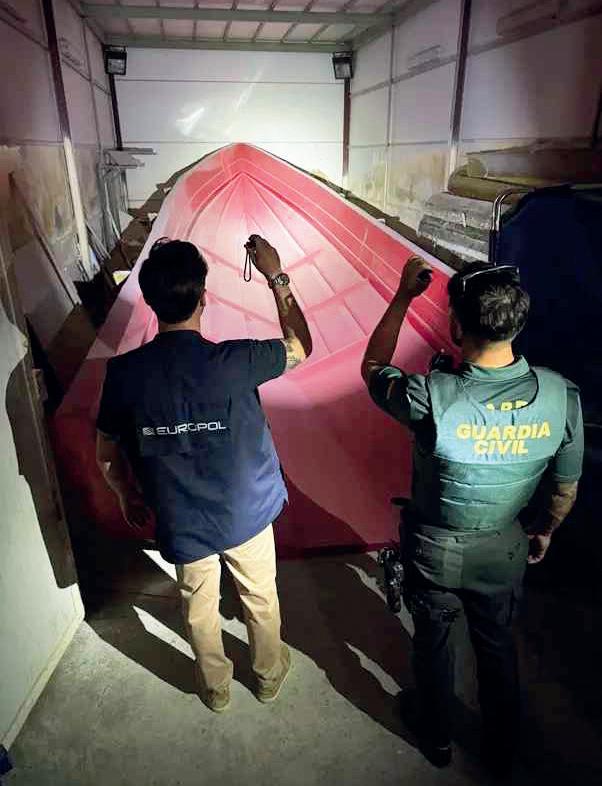
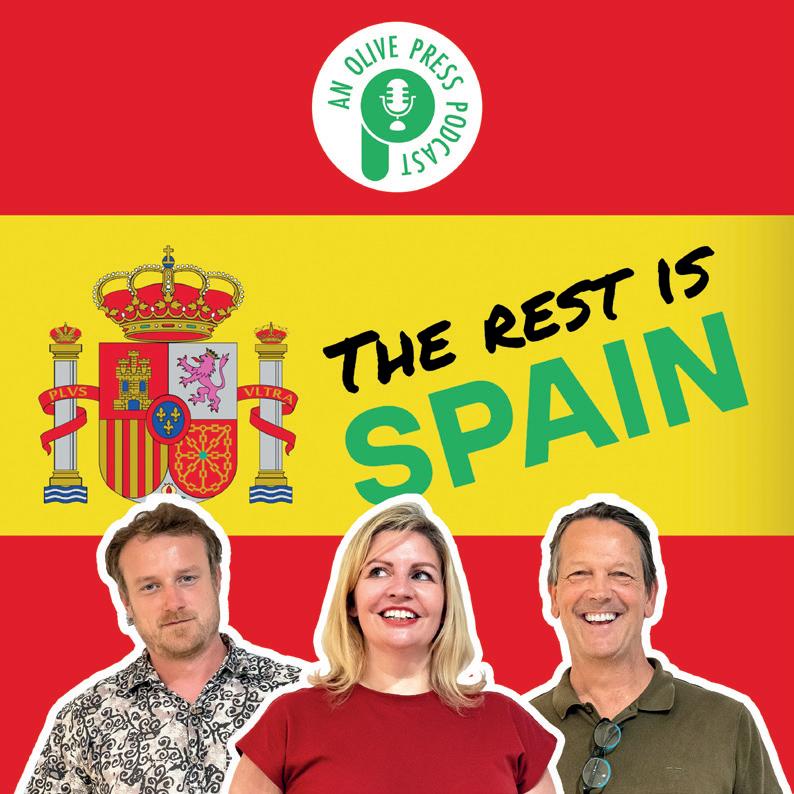
The Olive Press podcast is here –are you listening?
IT’S incisive, in-depth and always entertaining!
The rip-roaring Olive Press Podcast has returned from a summer hiatus – and immediately started to make waves.

Episodes 6 & 7 have come out in quick succession and they’ve been tackling hot topics like Tommy Robinson, Christian Brueckner and the genocide in Gaza.
Fronted by Caroline Lips, from Staysure Insurance, she welcomes editor Jon Clarke and digital editor Walter Finch every week or two.
The duo bring a wealth of insight into ongoing stories and investigations, revealing tidbits behind the scenes that don’t make it to print.



Between 30 minutes and 45 minutes in length, they are an intriguing behind the scenes look at what goes on both in Spain and in a busy newsroom.
Filmed at co-working space Centro House, in Marbella, it guarantees to give anyone interested in Spain a fresh insight into the country.
You can catch it on Spotify, Apple Podcasts and our Youtube





SPAIN is pushing ahead with plans to ban smoking on bar and restaurant terraces, as part of a broader anti-smoking law approved in draft form by the government.
The legislation would extend current bans to include outdoor areas like stadiums, children’s play areas, university campuses, and bus stops. It also covers e-cigarettes and other alternative tobacco products.
Health Minister Monica GarcIa said the law aims to protect public health, especially among youth, and bring Spain back to the forefront of anti-smoking efforts.
Though backed by many, including smokers, the law has already been watered down - plans for plain cigarette packaging were scrapped, and price hikes ruled out.
Anti-smoking groups criticised the government for yielding to tobacco industry pressure. Meanwhile, regions like Catalunya are pushing for tougher restrictions, including beach smoking bans.
Current figures show 28.9% of Spanish men and 22.6% of women are daily smokers.
THE first 60 minutes after waking up could hold the key to living longer.
According to Dr. William Li, a Harvard-trained physician, avoiding certain habits in the morning can have huge benefits to our health.
He explains that what you do, and don’t do, in that first hour can set the tone for your energy, focus, and even your long-term health.
One of the biggest mistakes, he warns, is immediately reaching for your phone when you wake up.
This, he says, overwhelms
By Adam Husicka
the brain at a time when it is most vulnerable, leading to stress and poor concentration throughout the day.
Another trap to avoid is hitting snooze and sleeping in.
Doing so prolongs “sleep inertia”, which is the grogginess that lingers after waking up, and can affect productivity and mood.
Getting up with intention is far more beneficial.
Dr. Li also suggests holding off on eating solid food for
AUTHORITIES have launched fumigation campaigns after mosquitoes carrying West Nile Virus were detected in Cadiz province.
The insects were trapped in Benalup-Casas Viejas and tested positive, prompting the Andalucian health department to declare the town an alert area for at least four weeks.
No human cases have been reported, but officials say the risk is real. In 2024, 158 people were infected in Spain –mostly in Andalusia – and 20 died from complications. That outbreak has made local councils determined to act early this year.
Spraying will run until November, tar-

about an hour after waking. Extending the overnight fast gives the body more time to burn fat and may slow cellular aging.
Coffee, however, is allowed, as long
geting larvae in ponds, wells and stagnant water before they mature into adults. The common house mosquito, which rarely travels far from water, is the main carrier.
as it’s black. Li highlights that caffeine and chlorogenic acid can kick-start metabolism and provide anti-inflammatory effects without disrupting the fasting state.

Benalup is one of 16 towns in Cadiz now listed as high risk, alongside Jerez, Vejer, Tarifa and Algeciras. Every municipality in Andalusia must also maintain its own mosquito control plan. Health officials advise residents to use repellents, cover up at dusk and dawn, fit nets at home, and eliminate standing water.

Light physical activity, such as stretching, is another key part of his routine, as it boosts circulation, flexibility, and oxygen flow to the brain.
Other healthy swaps for the first hour could include stepping outside for sunlight, practicing breathing exercises, meditation, or even a cold shower.
Li stresses there’s no onesize-fits-all formula. The important thing is to avoid habits that drain energy, choose two or three positive practices that fit your lifestyle, and stick to them consistently.
A HEALTH expert has warned that the way we exercise has to change as we age. Dan Buettner, an American expert in the study of ageing and longevity, who co-produced a documentary mini series called Live to 100: Secrets of the Blue Zones in 2023, explained that exercise needs to be undertaken in moderation as we grow old. High intensity exercise such as ultra marathons are actually more damaging as we can cause injury to our joints.
Buettner said: “The most incomplete belief about health and ageing is that we can exercise our way to a long life”.
Citing the statistic that 25% of Americans do less than 20 minutes a day of exercise, he recommended that walking on a daily basis is ‘much more likely to get you to 100 than pumping iron or running marathons’. Stressful training such as ultramarathons can shorten a lifespan as it increases inflammation and risks damaging joints and not being able to walk in the future. Overexertion is a dangerous path to be on, so moderation and safety and not pushing your body to its limit is highly recommended by Buettner.

PEDRO Sanchez’s minority govern ment suffered another setback as plans to cut the working week from 40 to 37.5 hours were voted down in Congress.
An unlikely alliance of PP, Vox and Junts per Catalunya – the party led by fugitive Carles Puigdemont – combined to block the bill, securing 178 votes in the 350-seat chamber. The proposal, championed by
SPAIN has been handed a major economic boost after ratings agency S&P upgraded its sovereign debt to A+ with a stable outlook.
The agency cited strong resilience, with GDP growth this year forecast at 2.6% – three times the eurozone average. It also underlined Spain’s low exposure to US tariffs, revived under Donald Trump’s new administration.
S&P praised immigration, particularly from Latin America, for bolstering the labour market and fuelling demand. Rising investment and earlier reforms were also flagged as

deputy PM Yolanda Diaz (left) and trade unions, would have benefited 12.5 million workers, reducing burnout and boosting productivity.
Diaz slammed the “three right-wing parties” for targeting supermarket cashiers, hospitality staff and
everyday workers, warning voters would remember their stance.
Opponents argued a shorter week would hit small businesses, risking jobs and raising costs.
Junts’ Miriam Noguera said: “We will not participate in a law that puts jobs at risk.” Diaz has promised to reintroduce the bill, calling Junts’ veto ‘incomprehensible’.
By Adam Husicka
key drivers. Unemployment is expected to fall below 10% by 2028, a level not seen since before the 2008 crash. Years of the pri-
SPAIN is staking its claim as Europe’s new financial powerhouse.
Banco Santander has been crowned the continent’s most valuable bank, with a market capitalisation of €128 billion, surpassing Italy’s UniCredit and Intesa Sanpaolo (€101 billion each) and dethroning Swiss giant UBS. Spanish banks BBVA (€95bn) and CaixaBank (€64bn) also make the EU top ten, giving the country three entries and signalling a shift south in Europe’s banking influence.
vate sector reducing its debt have strengthened Spain’s external accounts and reduced vulnerability to global shocks.
Economy Minister Carlos Cuerpo hailed the decision, calling it ‘a reflection of the strength of our economy’. He
Santander, founded in 1857 in the northern port city of Santander, now serves 160 million customers worldwide, with strong operations in the UK, Latin America, and beyond. Its recent acquisition of TSB added five million UK clients.
With three Spanish banks among Europe’s elite, the country has firmly established itself as a financial power capable of rivaling northern neighbours.
added Spain will again post the fastest growth among advanced economies this year, despite uncertainty in Europe. The ministry estimates the higher rating will save the state around €350 million in interest costs in 2024.
But S&P warned of risks. Spain’s fragile coalition has leaned heavily on regional parties, including debt relief and the controversial Catalan amnesty law. Corruption scandals have also been flagged as threats to political stability.
The upgrade contrasts sharply with France, which last week suffered a downgrade from Fitch due to worsening public finances – underlining the diverging fortunes of the eurozone’s southern powers.
you should never take investing tips from the front page, writes Peter Dougherty
HAS anyone ever got good investment advice from the front page of a newspaper or magazine? Probably not.
Still, the media churns out endless headlines telling us where to put our money. Why?
Because we love to read about markets and money – and secretly hope we might stumble across the golden tip that will make us rich.
Part of the problem is that we want investing to be simple. The idea that the next big stock pick might be hiding in an ar-
ticle is seductive. Even Warren Buffet (below) once said: “You don’t need to be a rocket scientist. Investing is not a game where the guy with the 160 IQ beats the guy with the 130 IQ.”
But the truth is investing is difficult
For starters, we are com peting with over 1.4 mil lion professional fund managers and analysts in the US alone. Skim ming a financial article doesn’t



Extract from complaint currently being dealt with by Oslo Conciliation Board – Dept 3 Case No. F2025-005059
Complainant: Kredinor Finans As, Postboks 782 Sentrum, 0106 Oslo
Defendant: Heidi Solberg. Sist kjente adresse: Barriada Los Guraos 65, Es-04647 Cuevas Del Almanzora, Spain
The Complainant has filed a complaint against the Defendant with Oslo Conciliation Board with a demand for payment of NOK 26988,10 with the addition of interest at the legal rate and legal costs. The Defendant is hereby ordered to reply to the Conciliation Board in writing by 11.11.2025 stating whether or not the Defendant acknowledges and accepts the Complainant’s claim. If a reply has not been delivered prior to the expiry of the stated time limit, judgment by default can be pronounced on the basis of the Complainant’s representation of the facts of the case
As the Defendant has no known address, service will be executed with authority in the Courts Act Section 181. The complaint and order to reply will be deemed to have been legally served when it has been posted at the legal venue for four weeks. The documents pertaining to the case can be collected from the Conciliation Board’s offices at Pilestredet 19, 0125 Oslo, Norway. The documents can be sent to a new address supplied by the Defendant if the Defendant so requests.





reading a menu makes us Michelin-star chefs. Then there’s human behaviour. We are wired for survival, not investing. Evolution has left us with the ‘fight or flight’ instinct – great for escaping danger, terrible for financial markets. It’s why people panic when they see headlines like Dow Jones falls
450 points’, even though that’s less than a one per cent drop.
At BISSAN Wealth Management, we know investing isn’t simple – but our approach can be. We tackle the panic-selling and impulse-buying bias in two ways:
1. Financial planning first. We start by mapping future needs – from retirement to property purchases – and park the money for these safely, out of market risk. The rest is invested long term.
2. Keeping cash ready. We deliberately hold back funds to invest only when markets fall. If the market drops 15%, we buy, safe in the knowledge that essential spending money is already protected.
It’s not perfect, but it works. As Buffet also said: “Knowing the limit of your competence is more important than being brilliant.”

By Dilip Kuner
FANCY a snap with Hollywood heartthrob Luke Evans? Or Berlin from Money Heist?
It’ll cost you a small fortune.
Comic-Con San Diego kicks off this Thursday and while fans are buzzing about big names like American legend Arnold Schwarzenegger (above left), Gwendoline Christie and Jim Lee, the real shocker is the price tag for a ‘meet-and-greet’.
Organisers are charging a whopping €90.75 (including VAT) for a single photo with Pedro Alonso (aka Berlin) and Luke Evans (above right).
You’ll also need to shell out the sizeable sum for Beverly Hills, 90210 star Brian Austin or His Dark Materials actor Dafne Keen. And if you want their autograph? That’s another €66.55.
Even the VOICE of Star Wars legend Ahsoka Tano, Ashley Eckstein, is on the same rate card.
Sessions will be held at the ‘Meet the Artists’ stand, but spots are limited. Fans must pre-book, pay upfront, and show proof before stepping into the booth.
The four-day pop culture extravaganza at Malaga’s Palacio de Ferias y Congresos is expected to pull in 120,000 visitors across 80,000 square metres of geek heaven.

But for many, the price of a quick snap could leave them seeing real stars!


November 29thDecember 12th 2023
LOOKING FOR MORE CULTURE STORIES?
Scan to visit our website OP Puzzle solutions
VERYONE knows Don Quijote, the world’s most famous novel. Most can even name its author - Miguel de Cervantes. But did you know that September 19 marked a pivotal moment in his life?
There’s still much we don’t know about Cervantes.
Born into a debt-ridden family in Alcala de Henares, near Madrid, much of his life was spent in poverty and on the wrong side of the law. Though he spent time in Sevilla and Cordoba, much of his early work has been lost to history. Through Don Quijote and other writings, Cervantes gave the world the picaresque novel - a genre that continues to influence storytelling today.
The picaro is an innocent figure, constantly caught up in one misadventure after another, yet never losing his cheerful disposition, no matter how hard fate seems to work against him. In many ways, Cervantes’ own life was like a picaresque tale.
In September 1569, at the age of 22, Cervantes found himself in Madrid. After a duel left a man wounded, an arrest warrant was issued for him.
Instead of facing years in jail, Cervantes chose to flee Spain, turning up in Rome shortly after.
At that time, Europe was on the brink of war. The Ottoman Empire had conquered much of Eastern Europe and was threatening Venice and Vienna. In one of the most famous naval battles in history - the
One of Spain’s greatest writers, Miguel de Cervantes, led a life as dramatic as his novels. Michael Coy takes a closer look at the man behind Don Quijote

Battle of Lepanto - Christian forces triumphed, and Western civilisation was preserved. Cervantes, eager to fight for his faith, enlisted in the Venetian navy and participated in the battle.
He was badly wounded, and his left arm was rendered useless. Nicknamed El Manco (the one-armed), Cervantes spent six ity paid his ransom and set him free.
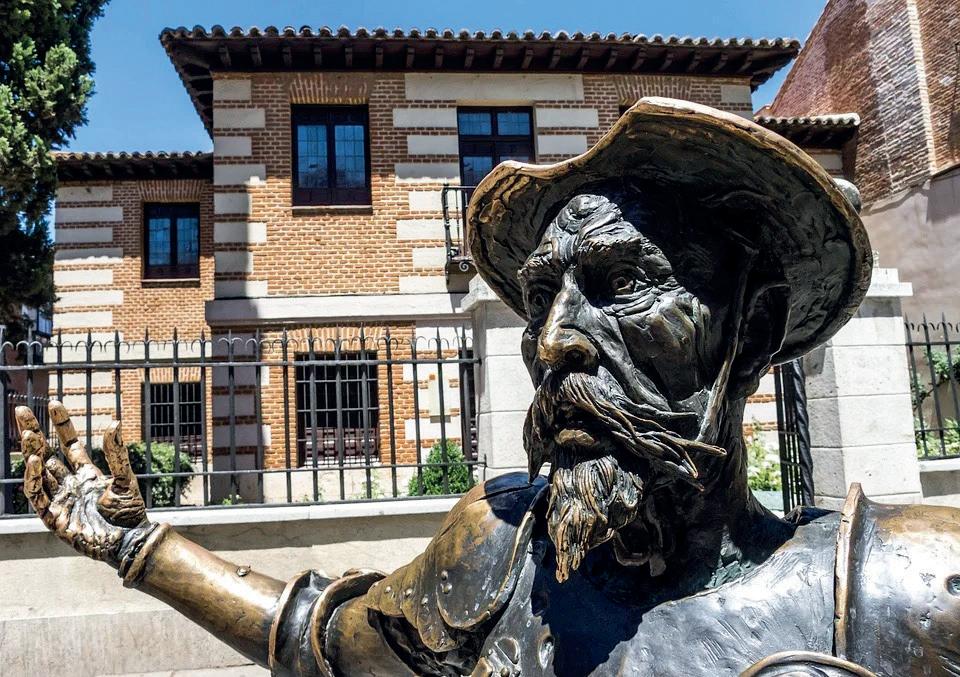

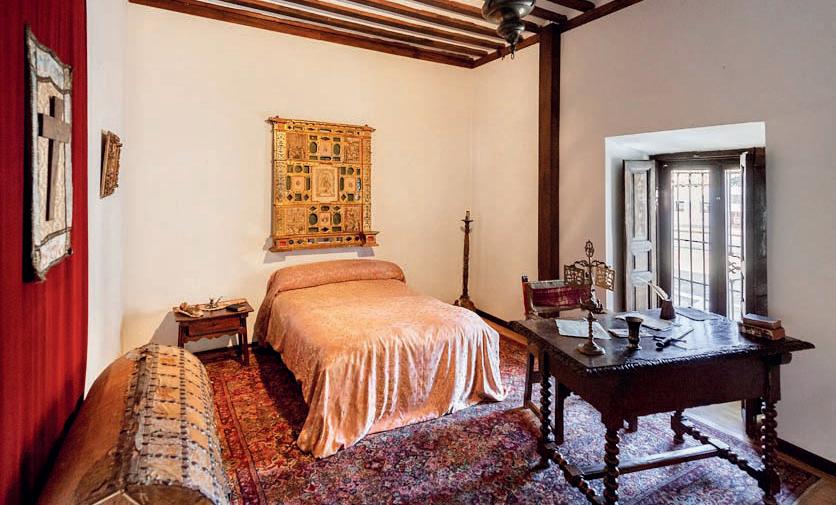
Across: 6 We’re even, 8 Melt, 9 Documentaries, 10 Base, 11 Inroad, 13 Let, 14 Tinsel, 15 Ages, 17 Commemorative, 20 Jean, 21 Seagulls.
Down: 1 Reno, 2 Bequests, 3 TV set, 4 Cmdr, 5 Illegals, 7 Not fit, 10 Boil over, 12 Right out, 13 Llamas, 16 Treat, 18 Mine, 19 Vole.



months in a Sicilian hospital recovering, only to face yet more misfortune. In 1574, Cervantes was captured by pirates while sailing from Naples to Barcelona and sold into slavery in what is now Algeria. For five long years, he remained a captive. But on September 19, 1580, at the age of 33, a Christian char-
Though penniless, Cervantes remained unbowed, ready to dive into more adventures.
Returning to Spain, he found himself in Toledo, where he married a much younger woman and fathered an illegitimate daughter. But his personal life was messy - his wife was soon to die, and Cervantes persuaded his sister to raise his child for him.
In the 1590s, Cervantes was back in Sevilla working as a supplier for the Spanish navy.

ning to rise to fame in England, but Cervantes, 17 years older, was still wrestling with debts and misfortune.
He remained unbowed, ready to dive into more adventures
When funds mysteriously went missing, he ended up in prison. By this time, William Shakespeare was begin-
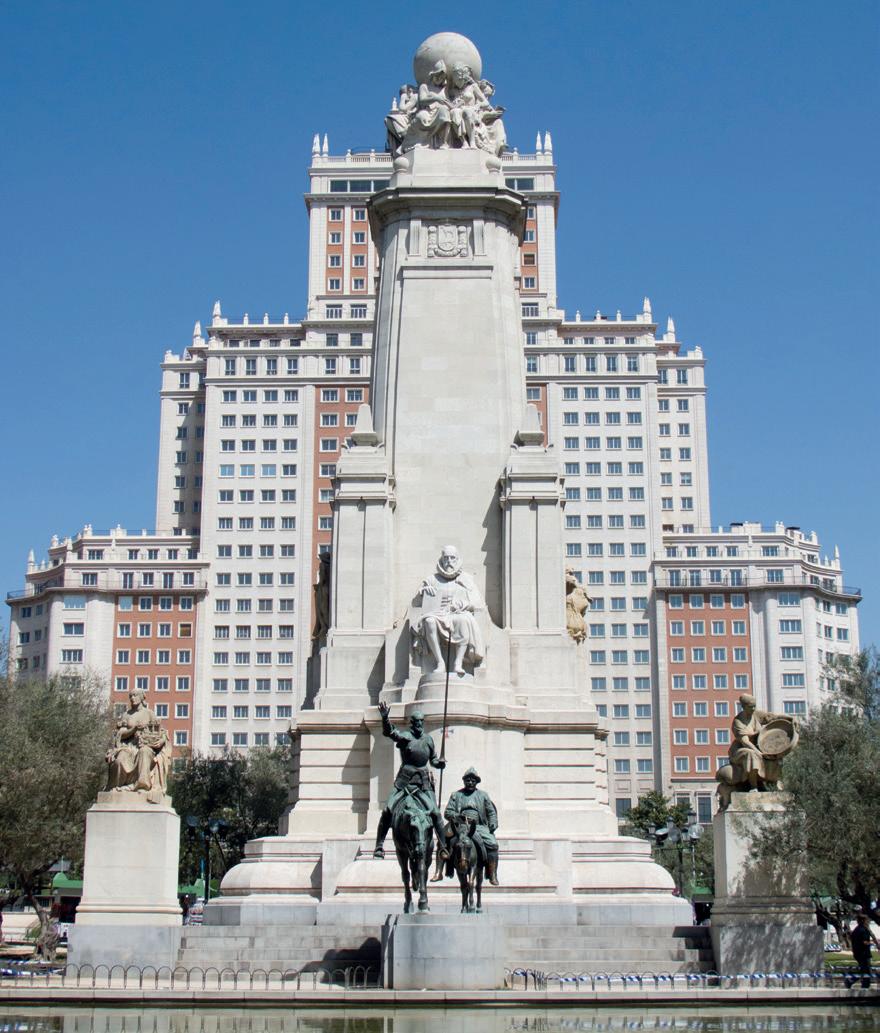
A plaque in Sevilla’s Calle Sierpes marks the spot where Cervantes was likely held in custody for debt. In his 40s, Cervantes landed a job as a tax collector - hardly a dream role, but one that kept him on the move and out of creditors’ reach.
He claimed to have visited every town in Spain, and in many places, locals proudly mark where Cervantes once stayed with the motto, ‘Cervantes slept here’.
The job also gave him precious time to write. He churned out plays, poems, and novels, but it was Don Quijote that truly made his name. The book was so successful that multiple bootleg versions began to surface, forcing Cervantes to write a second part to protect his masterpiece - and his royalties.
By 1616, Cervantes was nearing the end of his life. At nearly 70, he had no idea that his great rival, Shakespeare, had also reached the final stages of his own life.
In a strange twist of fate, both men died within days of each otherCervantes on April 22, 1616 and Shakespeare on April 23. Cervantes may have died in relative obscurity, but his legacy as the creator of Don Quijote and as one of Spain’s most celebrated writers lives on.
His life, filled with scrapes, escapes, and relentless optimism, truly reads like a picaresque adventure.

FOR many people who have made Spain their home –whether full-time or parttime – the country’s natural wealth becomes an inseparable part of life here. Increasingly, foreign residents are discovering that one way to give back is by leaving a solidarity legacy to WWF Spain in their will.
That was the decision taken
by Steve and Kay, a retired
British couple with a second home in Pilar de la Horadada (Alicante). Spending part of each year in Spain, they were struck by the outdoor lifestyle and wanted to contribute to protecting it.
“After making wills in the UK that left assets to various charities, we were keen to do something similar over here,” explained Steve.
“WWF España seemed a
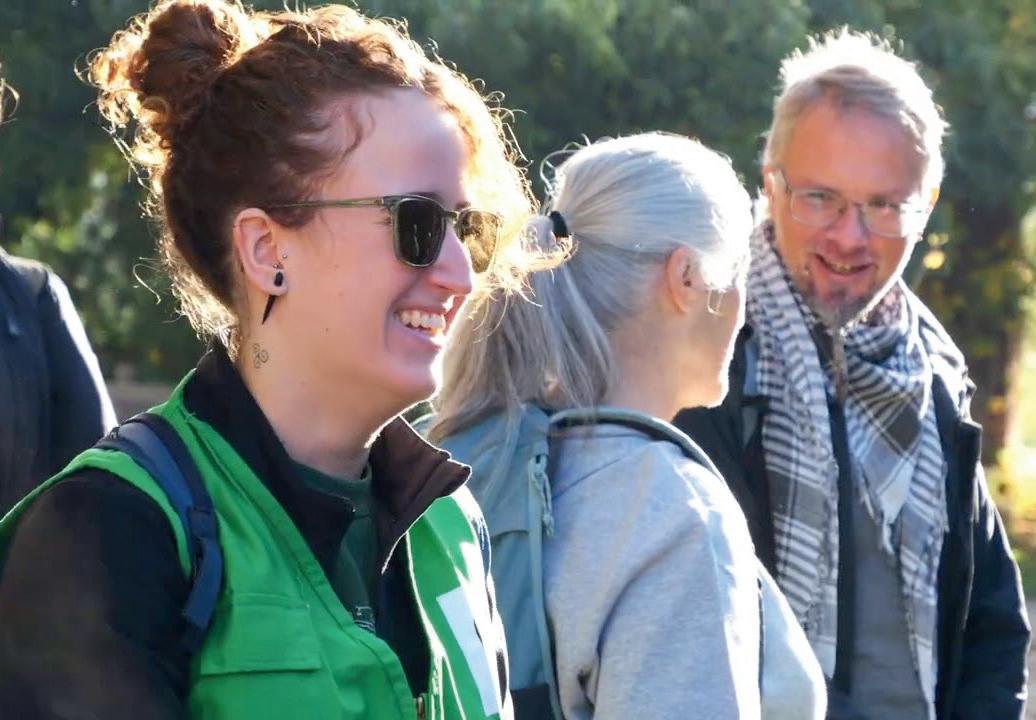
natural choice after reading about their work.”
The couple describe the process as simple and transparent. A local notary in Torrevieja, together with an interpreter, guided
A MARINE biologist has dismissed claims that octopuses are leaving Spain for the UK as a ‘snowball of misinformation’
Recent reports have suggested that octopuses are fleeing the Spanish coast of Galicia due to their inability to cope with rainfall and fluctuating water salinity, heading instead to UK shores. However, a marine biologist specialising in octopuses has debunked this theory, calling it misleading and confusing.
The claim is based on the idea that octopuses lack cortisol, a hormone that helps some animals adapt to salinity changes. But Alvaro Roura, a leading researcher on octopuses in Spain, refutes this, arguing that the presence or absence of cortisol does not force octopuses to migrate due to rain.
“Think about it - where does it rain more, Galicia or the UK?” he points out.
Roura explains that many marine species,

them through the legal steps in under an hour. “It was totally free of charge and very straightforward,” he added.
For Jan Willem de Haan, a Dutch lawyer who has lived in Spain for more than three decades, the choice to include WWF Spain in his will was both professional and deeply personal. Founder of De Haan Abogados, he regularly advises international
clients on inheritance issues – but his own connection to nature runs back to his childhood.
“I grew up with a strong sense of responsibility and spent my youth in one of the most emblematic nature parks in the Netherlands,” he recalls. “For me, leaving a legacy to WWF España is about giving back to the country where I’ve chosen to live.”

like fish and sea urchins, produce cortisol but are actually more sensitive to salinity changes than octopuses. In fact, the real problem for octopuses in Galicia is overfishing, both legal and illegal, not weather changes. Octopuses also have short life cycles, leading to natural fluctuations in their numbers.
Roura stresses that understanding these factors is vital to protecting the species and preventing misinformation.
De Haan believes many expatriates underestimate their ability to make a difference. “You can’t live with


your back turned to the country you move to. Spain’s biodiversity is extraordinary – from four species of vul-
THE Ministry for Ecological Transition has awarded state-owned energy giant HUNOSA the rights to connect a 50-MW biomass plant to the country’s grid.
The plant will be built at the retired La Pereda coal station in Asturias, converting it into a biomass facility.
HUNOSA was the only bidder for the 220-kV La Pereda node and won the tender thanks to its commitment to creating 1,565 full-time jobs, including new forestry roles, over six years.
The company also pledged to deliver over 37,000 hours of vocational training and install 6,050 kW of self-consumption capacity for homes and municipal buildings.
HUNOSA will invest over €41 million into the local economy and an additional €2.4 million in environmental projects, alongside a €6 million guarantee to ensure compliance.

tures to unique marine ecosystems – but it needs protecting. Foreign residents can and should be part of that effort.”
Both testimonies highlight the same message: leaving a gift to WWF Spain is a way to ensure the landscapes, wildlife and natural heritage we enjoy today are preserved for generations to come. As Steve puts it: “We can’t think of a better way of using any wealth we leave behind than to improve the world we live in.”
How to include WWF Spain in your will For more information, please contact WWF Spain on email at legadosconfuturo@wwf.es or call +34 91 354 05 78.






RYANAIR may have slashed 1 million seats in its spat with airports authority AENA, but Vueling has spotted its opportunity and added 1.5 million seats for 2026.
FANS of ‘establishment club’ Real Madrid have sparked outrage after chanting ‘Franco! Franco!’ for new €63m signing Franco Mastantuono - just months before Spain marks 50 years since the dictator’s death.
SPAIN’S new Customer Service Law will require large companies to offer support in Catalan, Basque, Galician, or Valencian when requested, but only if the goods or services were bought in those regions.
Spain’s new €35m patrol ship is making waves as it takes on the narcos
DRUGS smugglers plying their trade along the costas are about to get a nasty shock – Spain has just unveiled a shiny new €35 million patrol ship bristling with tech straight out of a Bond movie. The 83-metre long Duque de Ahumada – named after the 19th-century duke who founded the Guardia Civil – comes

By Ben Pawlowski
with all the trimmings: five decks, a heliport, two lightning-fast pursuit boats and even an underwater drone that can dive a full kilometre below the waves.
Launched with much fanfare in Vigo by Spain’s in-

terior minister Fernando Grande-Marlaska, the ship is largely EU-funded and will
BRIT pensioner Clifford Wildgoose, 76, sparked a frantic 48-hour hunt after vanishing on a night out in Puerto Banus. The grandad went missing at 2am after sinking pints at Patrick’s 19th Hole bar, leaving family ‘beside themselves with worry’ when he missed his flight home to Manchester. But the ‘wild goose chase’ ended when cops swooped in to collect him and rush him to hospital after he was spotted ‘tired and dehydrated’ in a local supermarket two days later.
spend a chunk of the year working with Frontex, the European border and coast guard agency. Its mission? Stamping out drug trafficking, tackling illegal migration and even keeping an eye on the environment.
“It’s a perfect example of
European cooperation,” said Grande-Marlaska at the ceremony, flanked by the Guardia Civil’s boss Mercedes Gonzalez and Vigo’s mayor Abel Caballero.
And this isn’t just a flashy floating toy. The Duque de Ahumada can stay at sea for a full 30 days, travel 11,000 miles without refuelling, and hit speeds of 18 knots – all while housing 44 officers and 12 support staff. Think of it as a floating fortress with room service.
After a round of sea trials, the ship will join the Guardia Civil’s maritime force in Cadiz, replacing the veteran Rio Miño.
A FED-UP Malaga biker has been slapped with a €250 fine after spray-painting a giant penis around a pothole that had plagued his street for years. Ricky Navarro, 49, from Carranque, decided enough was enough and channelled his inner ‘Wansky’ - the Manchester graffiti artist who draws X-rated pothole protests – by grabbing a spray can and filming his handiwork for TikTok. But just as he finished his masterpiece outside his home, a Policia Local patrol drove past.
Officers caught Navarro red-handed, mobile in one hand, can in the other, standing proudly by his creation.
The Harley rider, who said a friend once lost a leg to a pothole, insisted he just wanted to highlight the danger: “The first graffiti of my life and they catch me – I’m no good at being a criminal!” His cheeky protest may cost him, but his TikTok has gone viral.
